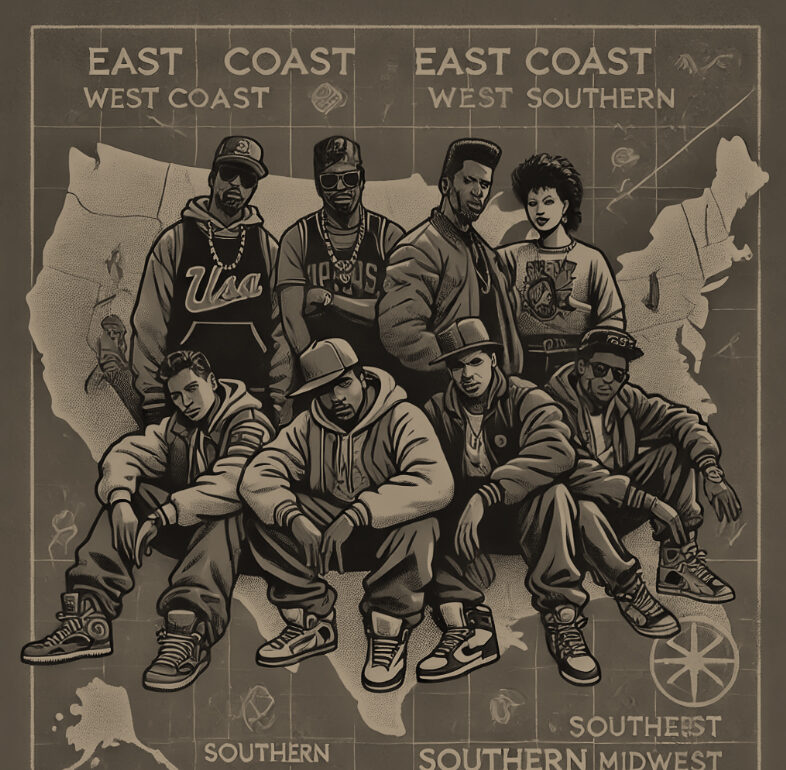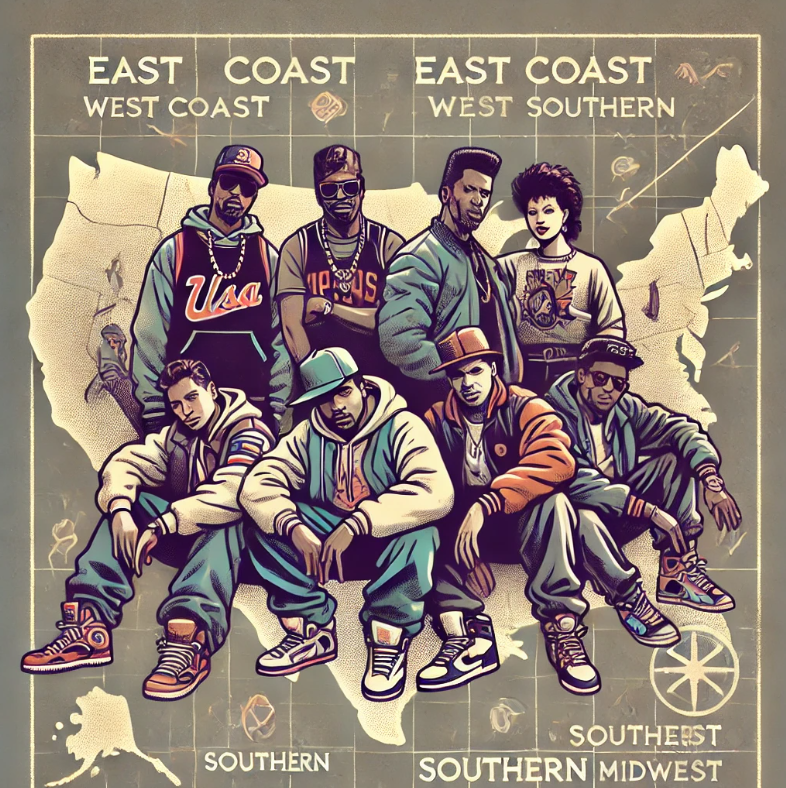
Hip Hop heads, gather round! Craving a deep dive into the regional sounds that shaped Hip Hop? Look no further! HHGA has curated a series of articles spotlighting the 25 essential Hip Hop albums from various cities and regions across the map. From the grimy boom bap of the East Coast to the laid-back flow of the West Coast, and everything in between, this gateway article serves as your one-stop shop to explore the rich tapestry of regional Hip Hop.
Get ready to unearth hidden gems and revisit classics that define a culture. We’ll delve into the lyrical prowess, innovative production styles, and cultural influences that made these albums regional landmarks. Whether a seasoned crate digger or a curious newcomer, this gateway article is your passport to a deeper understanding of Hip Hop’s diverse roots.
So, buckle up and prepare to embark on a journey through the heart of regional Hip Hop. Each featured city or region has its unique story, reflected in the music it produces. We’ll highlight the albums that captured the essence of these local scenes, the artists who pushed boundaries, and the sounds that resonated with a generation.
Ready to explore? Let’s break it down. This gateway article provides a convenient launchpad, offering a curated list of all the “25 Essential [City or Region] Hip Hop Albums” articles we’ve compiled. Each entry will be linked directly, allowing you to seamlessly jump into the specific region and era that piques your interest.
So, what are you waiting for? Dive in, (re)discover the classics, and uncover the hidden treasures of regional Hip Hop. Let the exploration begin!
25 Essential Atlanta Hip Hop Albums
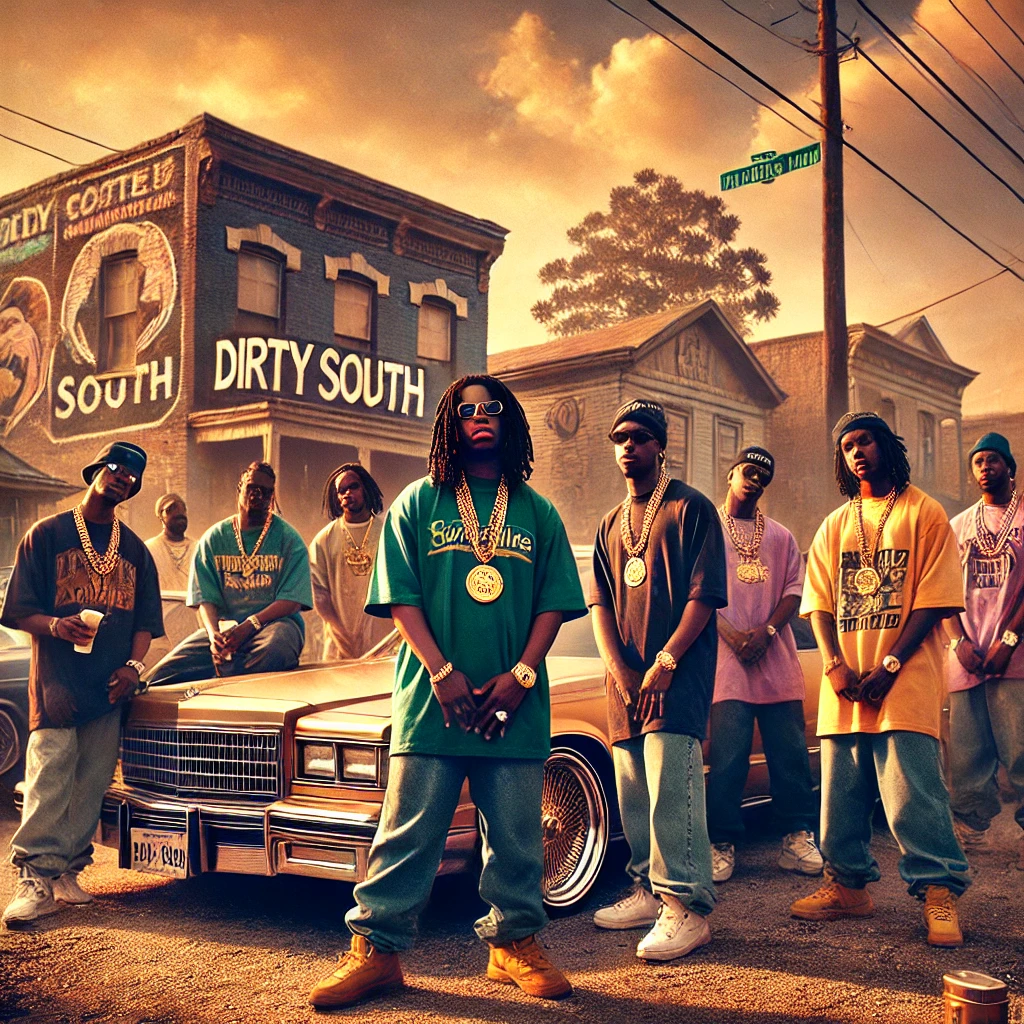


Atlanta’s Hip Hop story is one of constant evolution, a narrative woven from distinct sounds and shifting moods. While Hip Hop’s origins lie elsewhere, Atlanta claimed a unique space within the culture, developing a voice distinctly its own. This wasn’t an overnight phenomenon, but a gradual build, a series of sonic experiments conducted in studios, clubs, and car stereos across the city. This list of 25 essential albums offers a glimpse into that development, tracing the evolution of Atlanta Hip Hop from its nascent stages to its current global influence.
Early on, Atlanta’s Hip Hop scene was influenced by the sounds emanating from other regions. Miami bass, with its heavy 808s and party-centric lyrics, played a significant role. Artists like Kilo Ali and MC Shy-D brought this energy to the city, laying some of the initial groundwork. But Atlanta wasn’t content to simply replicate what was happening elsewhere. A desire for something different, something that reflected the city’s specific experiences, began to emerge.
The Dungeon Family, with its core members Outkast and Goodie Mob, became a focal point for this shift. Working with producers Organized Noize, they crafted a sound blending funk, soul, and gospel elements with sharp, insightful lyrics. Albums like Outkast’s Southernplayalisticadillacmuzik and Goodie Mob’s Soul Food presented a new vision of Southern Hip Hop, one that was both rooted in tradition and boldly innovative. These records offered a perspective, a view into the lives of Black working-class Atlantans. Songs like “Player’s Ball” and “Cell Therapy” painted vivid pictures of the city, its struggles, and its triumphs.
As the 2000s arrived, new sounds and styles began to take hold. Crunk, with its high-energy beats and shout-along hooks, became a dominant force. Lil Jon & The East Side Boyz took this sound to new heights, creating anthems designed for packed clubs and raucous parties. Tracks like “Get Low” became inescapable, their infectious energy defining a specific moment in Atlanta’s Hip Hop history. This period also saw the rise of artists like Ludacris, whose witty lyrics and flamboyant delivery brought a different flavor to the scene. His album Word of Mouf, with hits like “Area Codes” and “Rollout (My Business),” showed his unique approach, blending humor and bravado with undeniable musicality.
This list explores these distinct eras, examining not just the hits but the deeper cuts, the albums that helped shape Atlanta Hip Hop into the force it is today. It’s a celebration of the city’s creativity, its resilience, and its enduring influence on global music.
Full list: 25 Essential Atlanta Hip Hop Albums
25 Essential Bay Area Hip Hop Albums
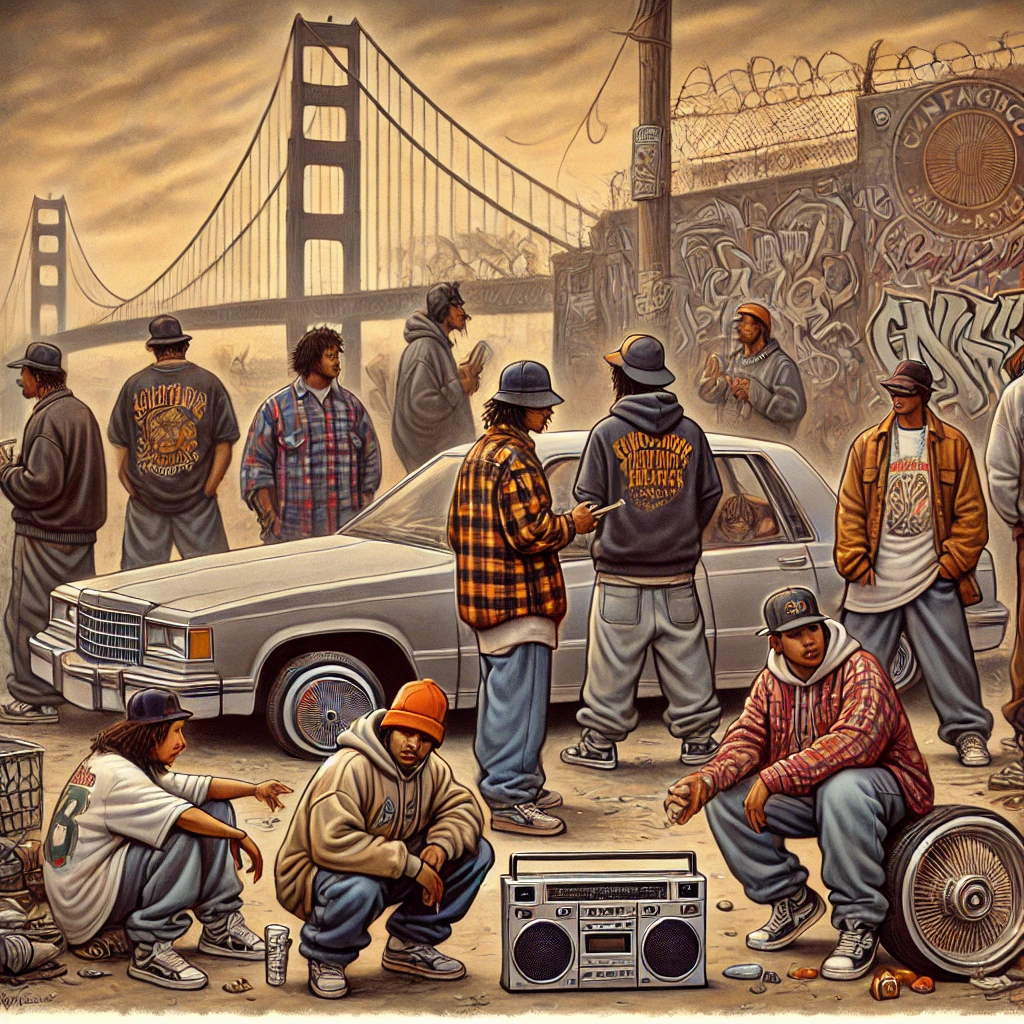


The Bay Area has long been a breeding ground for Hip Hop innovation, cultivating a sound that is as diverse as the communities it represents. From the streets of Oakland to the studios of Vallejo, the region has delivered music that is raw, inventive, and deeply rooted in lived experiences. Each album carries a distinct personality, shaped by local slang, regional beats, and the Bay’s unmistakable energy. Whether it’s the trunk-rattling basslines of the hyphy movement or the smooth introspection of underground lyricists, the Bay’s Hip Hop reflects a rich mosaic of creativity and resistance.
The sounds here defy easy categorization. Funk, soul, and mob music intermingle with electronic flourishes, creating records that feel grounded and futuristic all at once. Lyrically, the artists don’t shy away from speaking truth to power, but they also embrace storytelling, humor, and the art of having fun. This duality—serious and playful, hard-hitting and celebratory—infuses the music with a vitality that has made the Bay Area a distinctive voice in Hip Hop for decades.
This list of 25 albums highlights the breadth and depth of Bay Area Hip Hop, with a focus on Bay Area Hip Hop’s earliest periods that have shaped the culture and inspired future generations. From classics that defined eras to underground gems that deserve more attention, these selections span years of innovation and artistry. They reflect the sound of a region that has always danced to its own rhythm—bold, creative, and unapologetically authentic. Whether you’re revisiting these albums or discovering them for the first time, this exploration of Bay Area Hip Hop offers a window into the heart of a scene that continues to thrive on its own terms.
Full list: 25 Essential Bay Area Hip Hop Albums
25 Essential Boston Hip Hop Albums
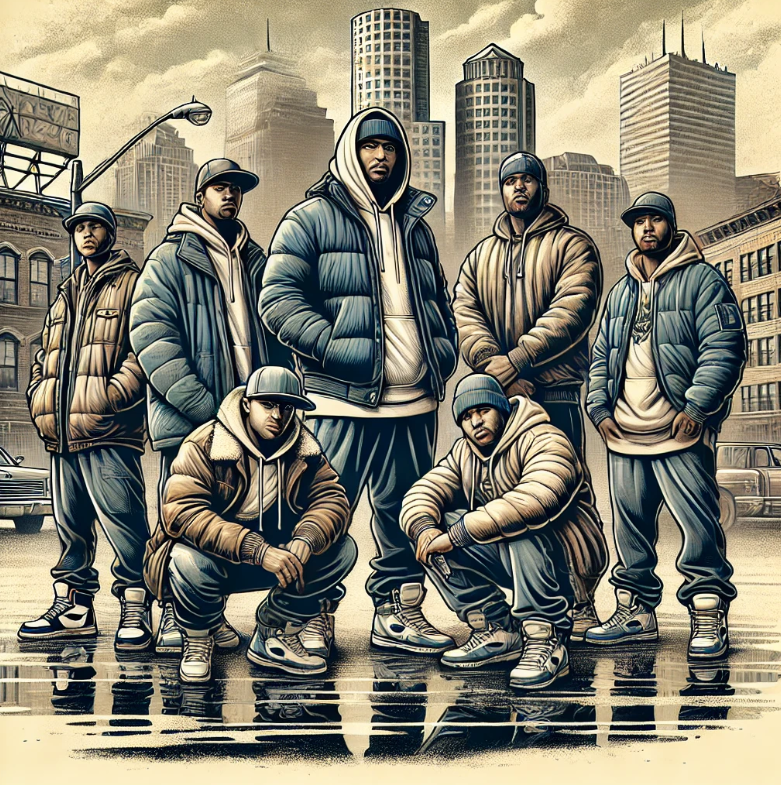


When you think of Hip Hop’s regional hotbeds, Boston might not be the first city that comes to mind. Yet, beneath its reputation for academia, revolutionary history, and sports dynasties lies a vibrant Hip Hop culture that has been shaping the genre in its own distinct way for decades. Boston’s Hip Hop scene is a melting pot, drawing from the city’s diverse neighborhoods, cultural intersections, and storied past. The result is a sound as multifaceted as the city itself—gritty and melodic, introspective and confrontational, traditional yet forward-thinking.
The story begins in the late ’70s, when the first echoes of Hip Hop made their way from the Bronx to Boston, spreading through college radio and underground parties. By the early ’80s, local artists were experimenting with electro-funk grooves, heavy drum machine beats, and synthesizer-driven rhythms that laid the foundation for a unique regional flavor. Tracks like Rusty P & The Sure Shot 3’s “Breakdown New York Style” exemplify this early innovation, fusing sharp lyrical delivery with a sound steeped in the era’s technological edge.
By the ’90s, Boston’s Hip Hop was coming into its own. Albums like Life of a Kid in the Ghetto by Edo. G & Da Bulldogs combined sharp storytelling with infectious hooks, painting vivid pictures of urban life. Meanwhile, Gang Starr, born in the city before Guru’s relocation to Brooklyn, brought an unmatched fusion of lyricism and jazz-infused production to the national stage. These projects reflected a duality in Boston’s music—an ability to mirror the raw realities of life while remaining artistically ambitious.
In more recent years, the city has given rise to a new generation of boundary-pushing artists, from the laid-back charm of Cousin Stizz to the sharp social critiques of Oompa and the kaleidoscopic bars of Joyner Lucas. These artists, and many others, continue to add new layers to Boston’s Hip Hop identity.
This list of 25 essential Boston Hip Hop albums captures the city’s earlier legacy, offering a deep dive into the beats, rhymes, and energy that defined the city’s sound. From the streets of Roxbury to the stages of Allston, these records reflect the resilience, creativity, and cultural depth of a city that deserves its place in the Hip Hop conversation.
Full list: 25 Essential Boston Hip Hop Albums
25 Essential Bronx Hip Hop Albums
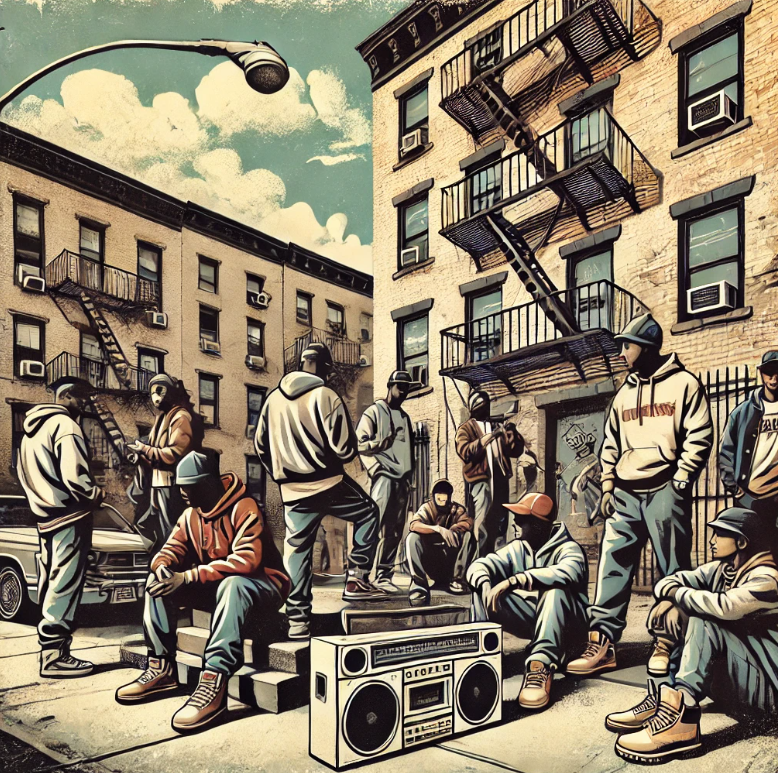


The Bronx is Hip Hop’s birthplace—a cultural epicenter where beats and rhymes were forged amid the borough’s energy and struggle. It’s where turntables became instruments, voices became vehicles for storytelling, and innovation thrived in the face of adversity. In the early 1970s, neighborhoods filled with apartment blocks and vibrant communities became the proving grounds for a sound and movement that would evolve into one of the most influential art forms of the modern era.
At its core, Hip Hop from the Bronx is raw, powerful, and deeply connected to its surroundings. The music is rooted in rhythm, built on the hard-hitting loops that DJs like Kool Herc pioneered at block parties in parks and community centers. It thrived on ingenuity—mixing, cutting, and extending breaks into something entirely new. The MCs who emerged brought voices of urgency and pride, reflecting the lives of those navigating economic hardship and systemic neglect. The beats hit heavy, the lyrics pulled no punches, and the sound carried an undeniable grit that mirrored the borough’s reality.
The albums born from this environment embody the Bronx’s resilience and its creative spirit. They echo the borough’s essence: unpolished yet intentional, celebratory but unafraid to confront pain. These records don’t simply exist as products of their time—they pulsate with the heartbeat of the Bronx itself, where Hip Hop wasn’t just heard but lived.
“25 Essential Bronx Hip Hop Albums” is a journey through these sounds. It’s a dive into music that moves beyond trends, rooted instead in the borough’s essence: its hustle, its creativity, its unapologetic authenticity. These albums tell stories that stretch from gritty street corners to the dance floors of legendary venues like Disco Fever. They reflect decades of evolution while staying tethered to the Bronx’s unique energy. Each album is a piece of the Bronx’s legacy—defining the past, shaping the present, and proving that Hip Hop’s origins remain as vital as ever.
Full list: 25 Essential Bronx Hip Hop Albums
25 Essential Brooklyn Hip Hop Albums
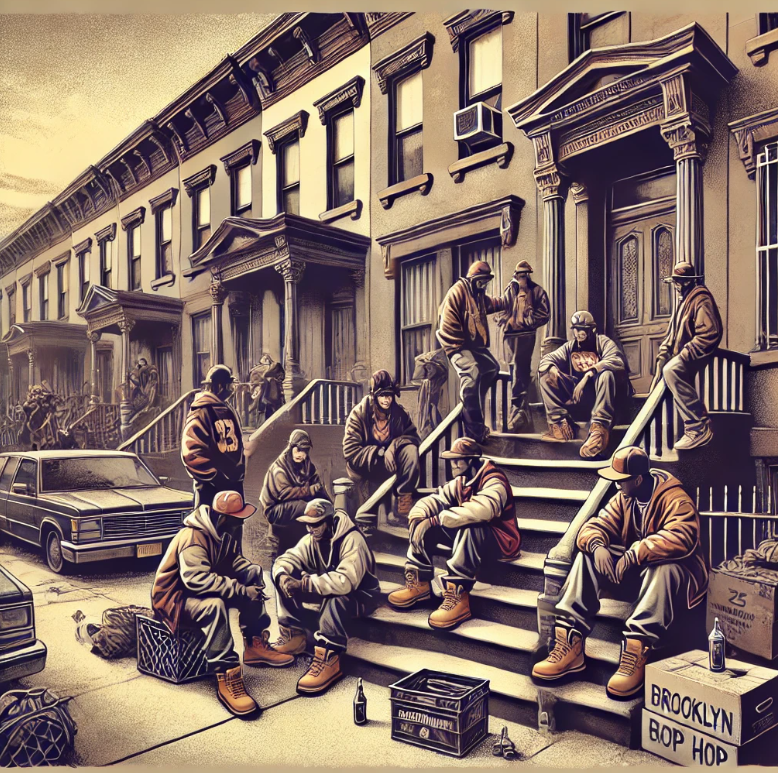


Brooklyn is Hip Hop’s beating heart. It’s where boom-bap drums hit heavier, where lyricism cuts deeper, and where the swagger of the streets spills into sound with unshakable confidence. For decades, the borough’s MCs have spoken loud, urgent truths, their voices echoing from Bed-Stuy to East Flatbush, Brownsville to Canarsie, and far beyond New York’s borders. The music born here doesn’t simply reflect a moment; it inhabits it, filling space with the grit and soul of lived experience.
Brooklyn’s musical identity has always been a mix of muscle and elegance. Rhymes unfurl like a conversation on the stoop—tough but effortless, quick-witted but deliberate. There’s weight in every pause and punchline. By the 1980s, when Hip Hop’s roots had already taken hold in the Bronx, Brooklyn MCs were honing their own style—less flashy, more focused, determined to carve out a voice on their own terms. Names like Big Daddy Kane and MC Lyte brought a level of precision and personality that made listeners lean in, listening closer.
Then came the 1990s. If the Bronx planted Hip Hop’s seed, Brooklyn gave it swagger. The borough stood at the center of an era when the music felt unstoppable—blaring from car stereos, shaking apartment walls, and commanding club speakers. The Notorious B.I.G.’s velvet delivery made tragedy sound poetic, while Jay-Z’s hustle inspired a generation. At the same time, Lil’ Kim and Foxy Brown flipped perspectives with style and ferocity, redefining power in their own voices.
But Brooklyn’s sound has always been bigger than one style, one scene, or one neighborhood. The borough carries a rhythm rooted in its diversity: the unmistakable influence of Caribbean culture heard in artists like Busta Rhymes, the jazz-laced introspection of Mos Def, and jazz-rap that has redefined the city’s sonic pulse, exemplified by Skyzoo. Across decades, Brooklyn has been both a battleground and a birthplace—a place where MCs fight to be heard and, in doing so, shape the way the world listens.
“25 Essential Brooklyn Hip Hop Albums” explores the music that has made this borough an undeniable force. These records don’t simply belong to Brooklyn; they are Brooklyn. They carry its tension and beauty, its history and dreams, packed into verses and beats that refuse to be forgotten. To highlight the borough’s immense talent, we limited entries to one album per artist—Brooklyn has far too many legendary voices to feature anyone twice, and even then, some greats had to be left out.
Full list: 25 Essential Brooklyn Hip Hop Albums
25 Essential Chicago Hip Hop Albums
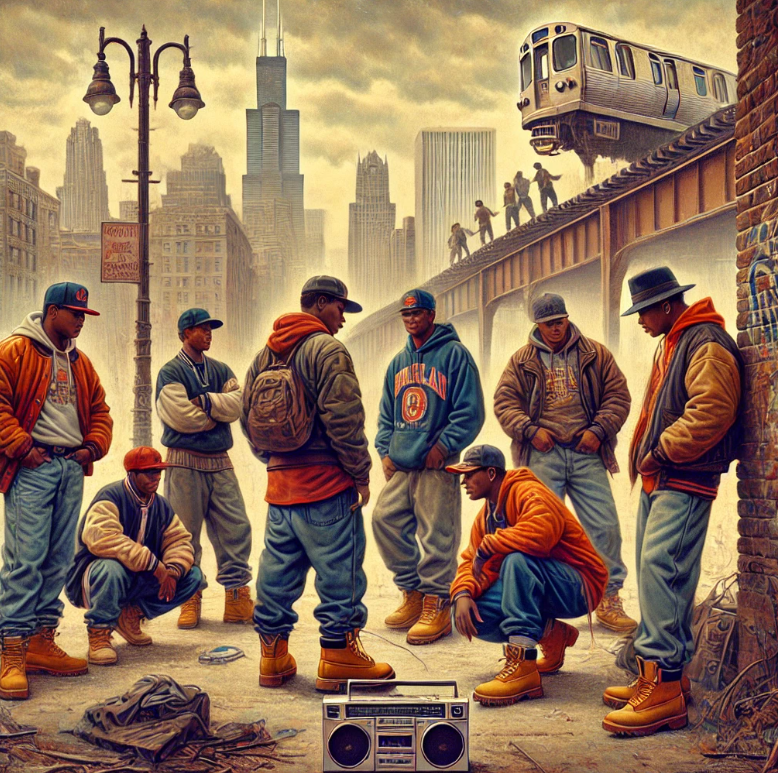


Chicago, often celebrated for its deep-dish pizza and jazz heritage, has also been a fertile ground for Hip Hop. The city’s Hip Hop scene is as diverse and dynamic as its storied neighborhoods, offering a sonic mosaic that reflects its rich cultural tapestry. From the soulful loops of the South Side to the avant-garde beats of the West Side, Chicago’s Hip Hop albums are characterized by their unique soundscapes, capturing the essence of urban life, social consciousness, and personal narratives.
In the early 90s, Chicago began to carve out its identity in the Hip Hop world, breaking away from the shadows of New York and Los Angeles. The city’s artists embraced a distinctive style, blending lyrical dexterity with beats that often featured elements of soul, blues, and jazz. This period saw the rise of seminal figures whose albums laid the groundwork for the city’s burgeoning Hip Hop identity.
Moving into the 2000s, Chicago’s Hip Hop sound evolved, marked by a raw and honest reflection of the city’s socio-economic realities. Albums from this era often juxtapose gritty storytelling with polished production, painting vivid pictures of the struggles and triumphs within the city’s streets. The use of sampling, a hallmark of Chicago’s sound, pays homage to the rich musical history that predates Hip Hop, creating a bridge between generations.
The new millennium also brought a wave of innovation, with artists experimenting with unconventional sounds and themes. These albums often feature a blend of electronic beats, live instrumentation, and introspective lyrics. This era of Chicago Hip Hop is characterized by its eclectic nature, showing the city’s ability to adapt and reinvent itself continuously.
In more recent years, Chicago has produced some of Hip Hop’s most influential and groundbreaking albums. These works are not only musically innovative but also thematically rich, addressing issues such as systemic inequality, personal identity, and social justice. The use of minimalist production techniques, along with a focus on lyrical content, has become a defining feature of this period.
Each of these 25 essential Chicago Hip Hop albums tells a story, offering a glimpse into the heart and soul of the city. They reflect the artists’ personal experiences and the broader cultural and social dynamics of Chicago. From the early pioneers to the modern trailblazers, these albums collectively showcase the city’s significant contributions to the genre. As you delve into this list, you’ll encounter the diverse sounds and voices that have made Chicago a pivotal hub in the Hip Hop world.
While compiling this list, we made some deliberate omissions that may raise eyebrows. Da Brat’s Funkdafied, despite its historic significance as the first platinum solo album by a female artist, didn’t make the cut—even if this is not a ranking. At barely over EP length, it falls short in duration, and frankly, it never resonated with us musically. We think Funkdafied is overhyped. Similarly, Twista, undeniably a legendary Chicago rapper, finds himself absent from our selection. While his technical prowess is impressive, we feel his discography lacks a truly memorable album. Twista’s releases are light on content and are built on mediocre beats, with Twista primarily relying on his rapid-fire delivery. No Chief Keef either—a significant figure in Chicago Hip Hop, of course, we just don’t like his music. That said—check it out:
Full list: 25 Essential Chicago Hip Hop Albums
25 Essential Compton Hip Hop Albums
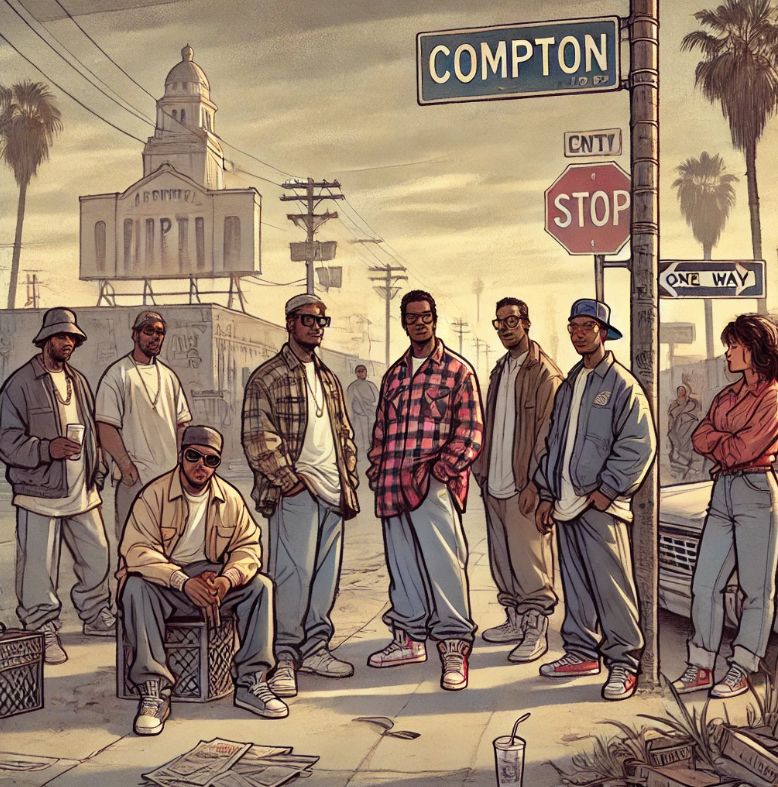


Compton. The name itself conjures a distinct image, a place etched into the global consciousness through music. More than palm trees and sun-drenched streets, Compton became synonymous with a raw, urgent form of Hip Hop that exploded onto the scene in the late 80s and early 90s. This wasn’t party rap or feel-good anthems; this was music born from lived experience, reflecting the realities of a specific time and place. This music crackled with a distinct energy, a mix of defiance, frustration, and stark observation. The drum machines hit hard, the basslines rumbled, and the lyrics painted vivid pictures of life in the city.
This sound, this mood, this way of structuring rhymes and beats, didn’t appear from thin air. It grew from a specific environment, a convergence of talent and circumstance. This is the story told through 25 essential Compton Hip Hop albums, a deep dive into the records that shaped a generation and continue to influence music today. These albums are snapshots of a community, a chronicle of its struggles and triumphs. They are documents of a time when Hip Hop became a vehicle for telling complex stories, for giving voice to the unheard.
From the early rumblings of electro-funk-infused Hip Hop to the emergence of gangsta rap, Compton artists developed a distinct style. The production often featured heavy use of samples, creating dense, layered tracks with a gritty texture. Think hard-hitting 808s, driving basslines, and sharp, percussive elements. The rhythmic patterns were complex and syncopated, creating a sense of urgency and momentum. This wasn’t music for the faint of heart; it demanded attention, forcing listeners to confront the realities it depicted.
The lyrical content, too, was unlike anything heard before. It was direct, often confrontational, and unflinchingly honest. Compton artists rapped about their experiences with poverty, police brutality, gang violence, and the daily struggles of life in Compton. They used vivid imagery and storytelling techniques to bring their narratives to life, creating a powerful sense of place and atmosphere. Albums like N.W.A.’s Straight Outta Compton became cultural touchstones, not only for their musical innovation but also for their social commentary. This article explores 25 albums that contributed to this unique chapter in Hip Hop history, each offering a distinct perspective on the Compton experience.
Full list: 25 Essential Compton Hip Hop Albums
25 Essential Detroit Hip Hop Albums
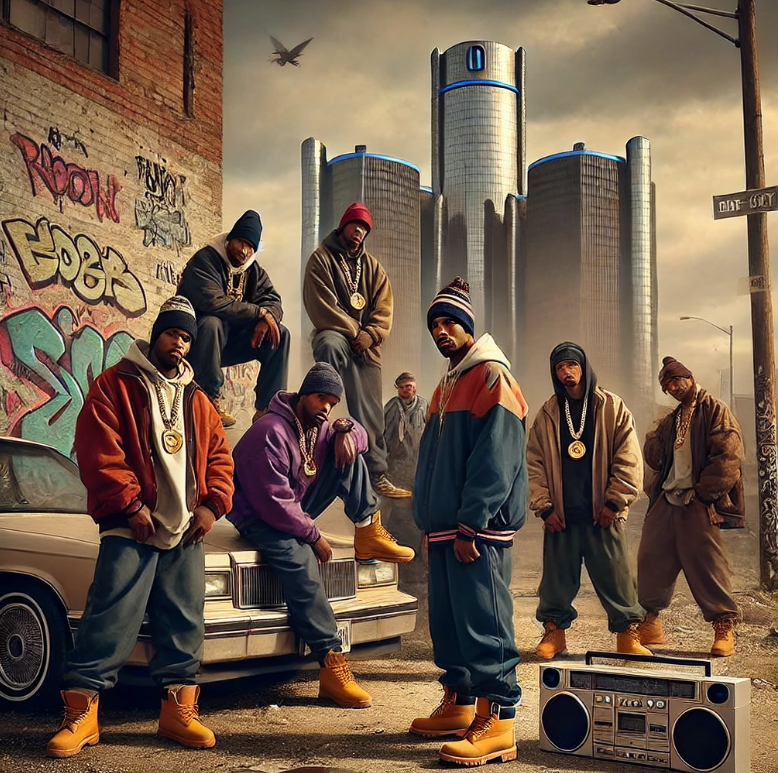


Detroit’s urban rhythm pulses like an engine block, its Hip Hop albums spinning stories etched deep into motor city concrete. This collection explores 25 records that transformed sound linguistic blueprints of survival, resistance, and raw creative power.
The D’s Hip Hop isn’t polite. It growls from industrial landscapes, where abandoned factories echo with rhythmic innovation and street poetry. These albums are audio documentaries mapping neighborhoods, detailing struggles, and broadcasting unfiltered urban experiences. Each album here carries the weight of economic collapse, racial tension, and working-class resilience.
From the early underground mixtapes to landmark recordings that reverberated nationally, Detroit artists constructed a brutal and beautiful musical language. The city’s sonic architecture reflects its physical reality: fractured, intense, and rebuilt from whatever materials are available. Rappers here use words like welding tools, constructing narratives that slice through expectations and reveal uncomfortable truths.
Technicians and poets, these musicians transformed personal narratives into collective memory. Their albums represent more than individual artistic statements—they’re communal conversations happening at maximum volume. The beats hammer like assembly line machinery, the rhymes cut with precision, each track a transmission from neighborhoods most listeners would never otherwise understand.
Detroit Hip Hop carries a particular gravity. It’s constructed from economic struggle, racial dynamics, and a fierce commitment to articulating experiences typically silenced. These 25 albums document a city’s intellectual and emotional landscape, revealing complex human experiences beyond simplistic narratives about urban life. The records compiled here are historical documents, sociological investigations, and raw emotional expressions compressed into rhythmic form. They tell stories about survival, aspiration, pain, and extraordinary creativity emerging from challenging circumstances.
When you listen to these essential Detroit Hip Hop records, you’re experiencing a city’s heartbeat, intellectual current, and unrelenting spirit of reinvention. Detroit Hip Hop doesn’t request understanding. It demands it.
Full list: 25 Essential Detroit Hip Hop Albums
25 Essential Houston Hip Hop Albums
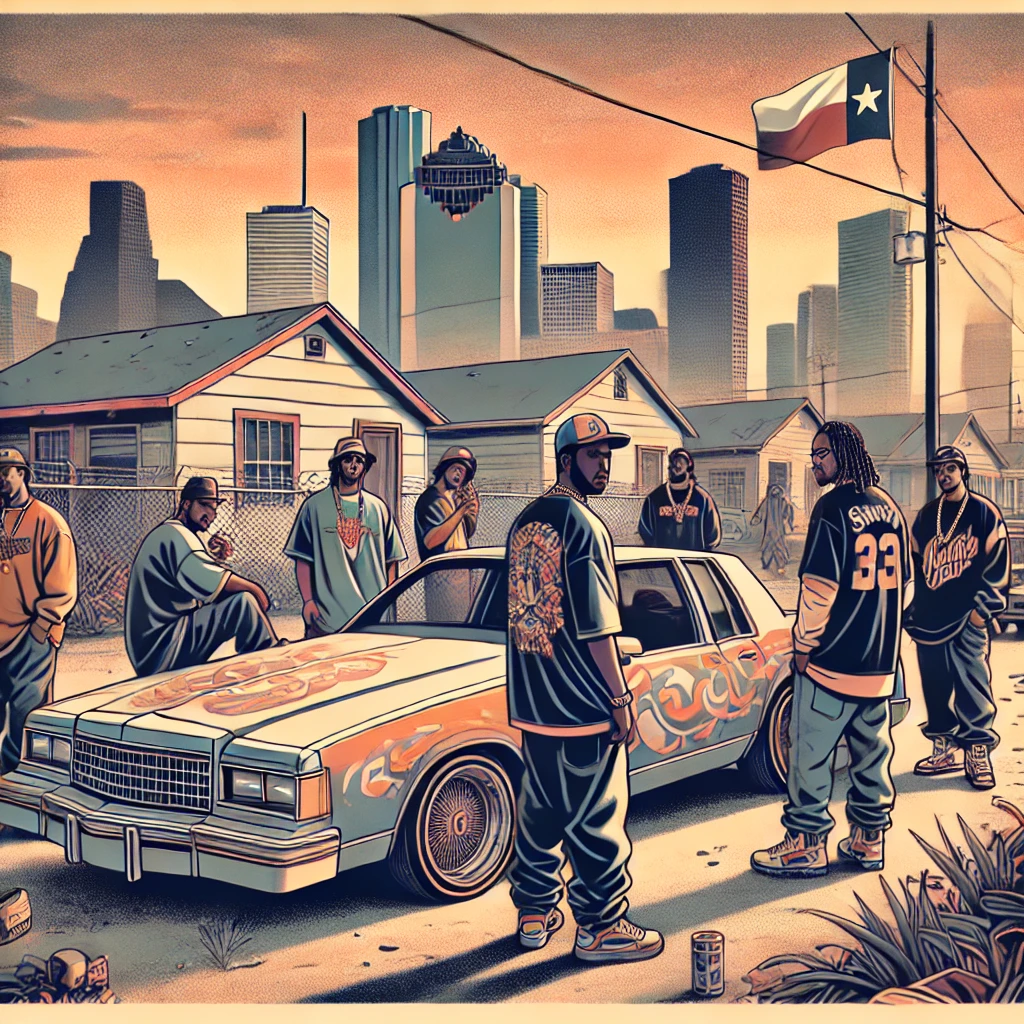


Houston is one of Hip Hop’s most vibrant cultural hubs, with a sound and attitude shaped by its streets, history, and relentless individuality. From the haunting narratives of Geto Boys to the slowed-down, syrup-soaked experiments of DJ Screw, the city’s music has always been as diverse as its sprawling landscape. It’s a place where grit meets soul, where pain and triumph bleed into every beat. Over decades, Houston has carved out its own identity in Hip Hop—not as a regional offshoot, but as a foundational voice in the culture.
The beauty of Houston rap lies in its duality. It’s deeply introspective yet undeniably bold. Early pioneers like Scarface built vivid cinematic tales of survival and introspection, while Screw’s chopped-and-screwed style stretched time itself, reimagining the way music could move and feel. Albums from this scene don’t just make you listen—they force you to sit with their weight, whether it’s the paranoia of The Diary, the woozy hypnotism of Screw tapes like 3 ‘n the Mornin’, or the opulent swagger of Swishahouse-era anthems like Paul Wall and Chamillionaire’s “Get Ya Mind Correct”. The music reflects Houston’s soul: resilient, unhurried, unshakably confident.
It’s impossible to talk about Houston Hip Hop without acknowledging the culture surrounding it. The city’s slabs—custom cars with candy paint and swangas—are as much a part of the music as the beats and rhymes. The lifestyle, from the diamond grills to the “drank,” informs the sound in unmistakably Texan ways. Even as Houston artists gained national recognition in the early 2000s, that local pride never wavered. Whether it was Mike Jones turning a phone number into a marketing phenomenon or UGK blending Southern soul with hard-hitting truths, Houston rap has always been rooted in its sense of place.
While some might expect to find UGK’s releases in this collection, Port Arthur – nearly 100 miles southeast of Houston – has its own distinct identity and musical legacy, separate from Houston’s rich Hip Hop history. Though the two cities share cultural touchstones, this list focuses specifically on albums that emerged from Houston proper and its immediate metropolitan area.
This list of 25 essential albums explores the depth and breadth of Houston Hip Hop. From classic records that defined the city’s sound to modern projects that push it into new territory, these albums capture the essence of a scene that’s never conformed to anyone else’s rules. Each project offers a snapshot of a moment, a mood, or an evolution in a city that continues to shape the sound and spirit of Hip Hop.
Full list: 25 Essential Houston Hip Hop Albums
25 Essential Los Angeles Hip Hop Albums | Part 1
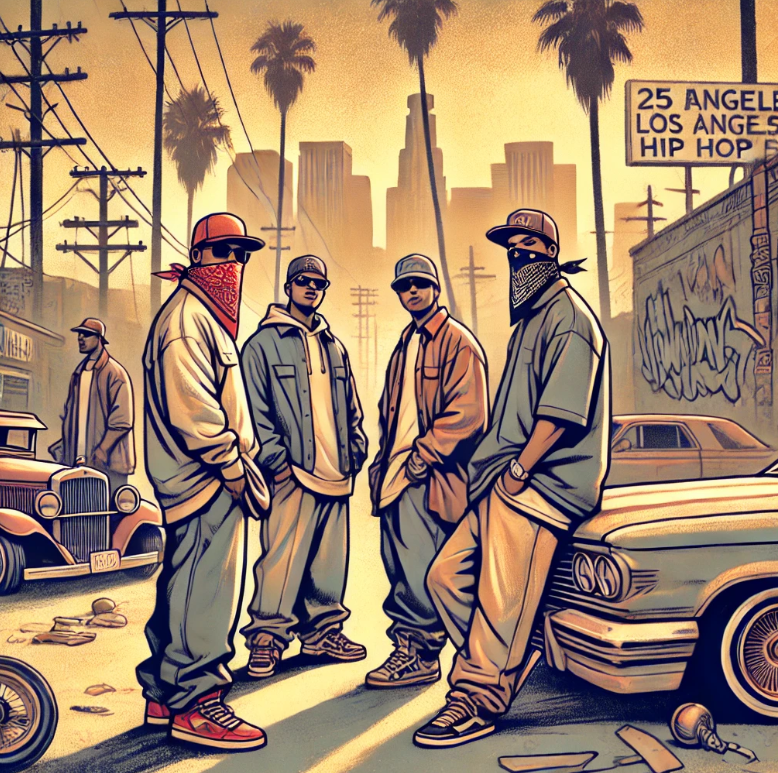


Los Angeles is a sprawling, multifaceted city, and its Hip Hop scene mirrors its complexity. Earlier, we explored “25 Essential Compton Hip Hop Albums,” highlighting a part of L.A. that has long been synonymous with groundbreaking contributions to the genre. But Compton is just one part of the story. Los Angeles as a whole is a mosaic of cultures, neighborhoods, and sounds, and its influence on Hip Hop stretches far beyond any single locale. With this list, we turn our attention to the broader LA scene, spotlighting 25 albums from the city’s golden era, released between 1987 and 1996.
This was a transformative period for Hip Hop, not only in Los Angeles but globally. The records from this era shaped how the world perceived West Coast rap, introducing a diverse array of styles, perspectives, and sonic innovations. These albums were born from the city’s sun-drenched streets, gritty alleyways, and creative studios, reflecting a spectrum of experiences unique to the LA ethos. From jazzy loops and trunk-rattling basslines to sharp social commentary and hedonistic party anthems, the music during this time was as varied as the city itself.
Some of these albums capture the stark realities of life in South Central and East LA, painting vivid pictures of tension, resilience, and defiance. Others lean into infectious grooves and catchy hooks, reflecting the city’s love of cruising and nightlife. Together, they underscore the creative brilliance of Los Angeles artists who took the framework of Hip Hop and reshaped it with their own distinctive flair.
This list deliberately excludes Compton albums, offering instead a broader look at Los Angeles during a time when Hip Hop grew from a grassroots movement into a dominant cultural force. Each album featured here is a reflection of the time and place it was created, contributing to the larger narrative of LA’s Hip Hop legacy.
Let’s dive into these 25 essential albums, each a defining piece of the city’s golden-age Hip Hop puzzle.
25 Essential Los Angeles Hip Hop Albums | Part 2
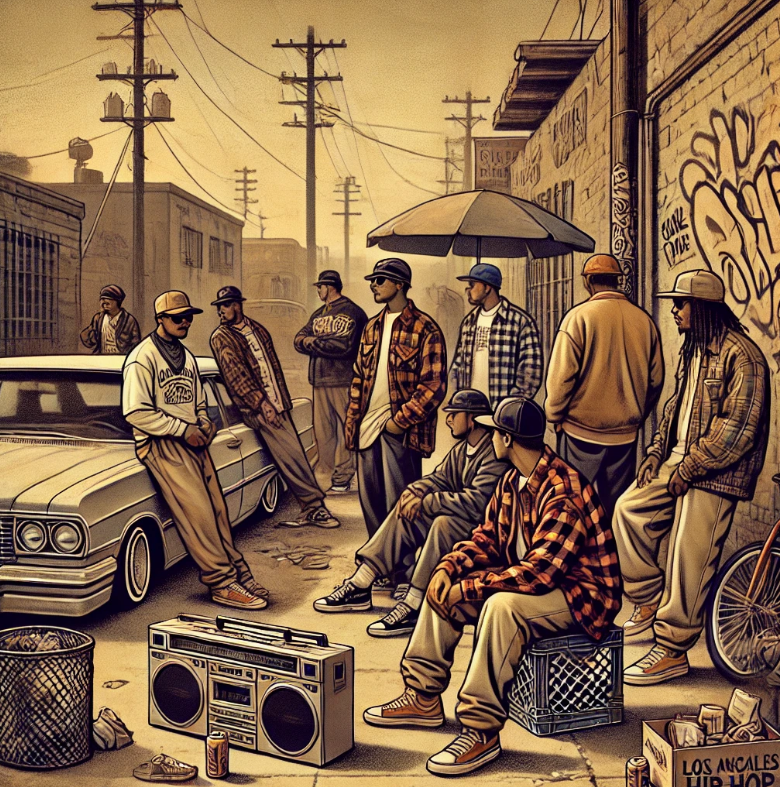


Los Angeles Hip Hop didn’t stop evolving after the golden age—it only grew more expansive, diverse, and innovative. In Part 1, we explored 25 Essential Los Angeles Hip Hop Albums released between 1987 and 1996, a transformative era when the city’s artists reshaped the genre with bold sounds and powerful storytelling. Now, in Part 2, we move past 1996 to uncover how LA Hip Hop continued to thrive, featuring albums that reflect the city’s ever-expanding creative horizons.
This period showcases the depth and breadth of Los Angeles Hip Hop, spotlighting underground innovators and mainstream disruptors alike. Groups like People Under The Stairs, Jurassic 5, and Dilated Peoples kept the spirit of the boom-bap era alive, offering intricate wordplay and rich, sample-based production. Meanwhile, a new generation of artists emerged with fresh perspectives and unique sounds, including Ab-Soul, Vince Staples, ScHoolboy Q, Earl Sweatshirt, and Tyler, the Creator. Each brought their own voice to the table, redefining what LA Hip Hop could mean in the 21st century.
These albums reflect a city constantly in flux, where new movements and voices rise while honoring the legacy of those who came before. The soundscapes are as varied as the city itself, spanning laid-back grooves, introspective lyricism, and hard-hitting anthems. Some records look inward, grappling with personal struggles or societal issues, while others explode with the energy of LA’s thriving nightlife and its endless drive for reinvention.
Part 2 also highlights the resilience and adaptability of Los Angeles Hip Hop in the face of industry shifts and changing cultural tides. From indie labels to global platforms, these artists have carved out their place with creativity and determination, keeping LA at the forefront of the genre.
Together, the albums in this list tell a story of continuity and change, revealing how Los Angeles Hip Hop has remained vital, relevant, and undeniably influential. Whether you’re a longtime fan or discovering these records for the first time, this collection reflects the richness of LA’s Hip Hop scene after 1996.
25 Essential Long Island Hip Hop Albums
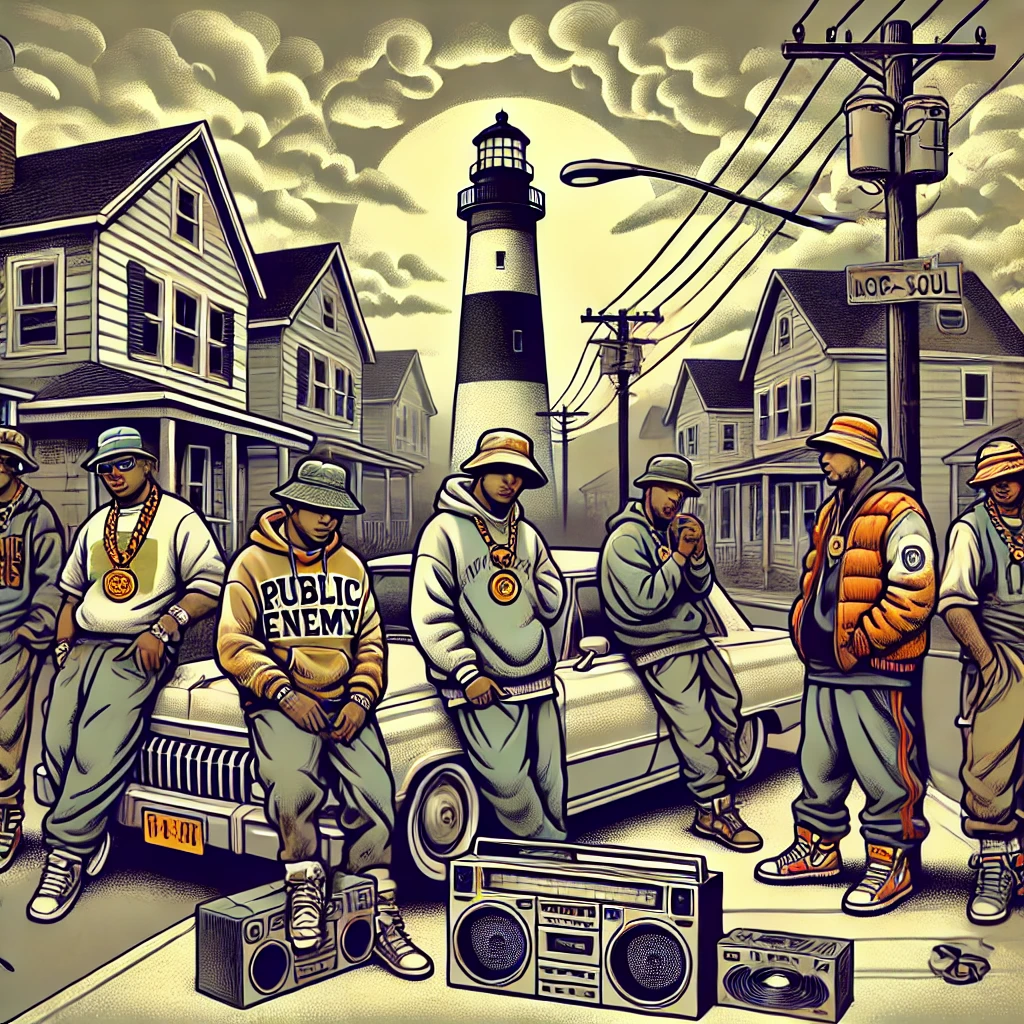


Long Island occupies a unique place in Hip Hop’s lineage, often standing in the shadow of New York City’s five boroughs while quietly shaping the genre’s sound, ethos, and evolution. Stretching east of Queens, this suburban expanse has produced some of the most influential and innovative voices in Hip Hop, redefining what it means to belong to the culture. From the early days of Rakim’s intricate lyricism to the genre-defying creativity of De La Soul, Long Island artists have consistently challenged conventions, proving that Hip Hop’s core elements can thrive outside the urban epicenters where the genre was born.
Long Island isn’t a region with one signature sound—it’s a mosaic of styles and approaches that reflect its sprawling geography and cultural mix. On one end, you have the politically charged anthems of Public Enemy, their urgent delivery wrapped in dense, chaotic production that made resistance feel like a sonic riot. On the other, there’s EPMD, whose laid-back, funk-laced beats made you nod your head without even realizing it. De La Soul turned Hip Hop inside out with their playful, psychedelic samples and introspective lyrics, while Leaders of the New School brought frenetic energy and off-kilter flows that defied easy categorization. And that’s just scratching the surface.
The tension between Long Island’s suburban roots and the gritty, streetwise origins of Hip Hop has always made for compelling art. Its artists often blended sharp observations of their surroundings with imaginative escapism, creating grounded and visionary music. Rakim’s smooth, precise delivery redefined how emcees approached rhythm and wordplay, while Public Enemy’s Bomb Squad production rewrote the sampling rules, turning sound snippets into jagged, powerful collages. These weren’t merely regional acts—they were architects of the genre.
This list of 25 essential Long Island Hip Hop albums celebrates the depth and breadth of the region’s contributions, revisiting records that have shaped the genre while continuing to inspire new generations. Whether they were flipping jazz loops into new sonic realms, crafting anthems of rebellion, or penning verses so sharp they seemed carved from stone, these artists proved that Long Island is as vital to Hip Hop as any borough. Let’s dig into the sounds, moods, and innovations that made Strong Island a force to be reckoned with.
Full list: 25 Essential Long Island Hip Hop Albums
25 Essential Manhattan Hip Hop Albums
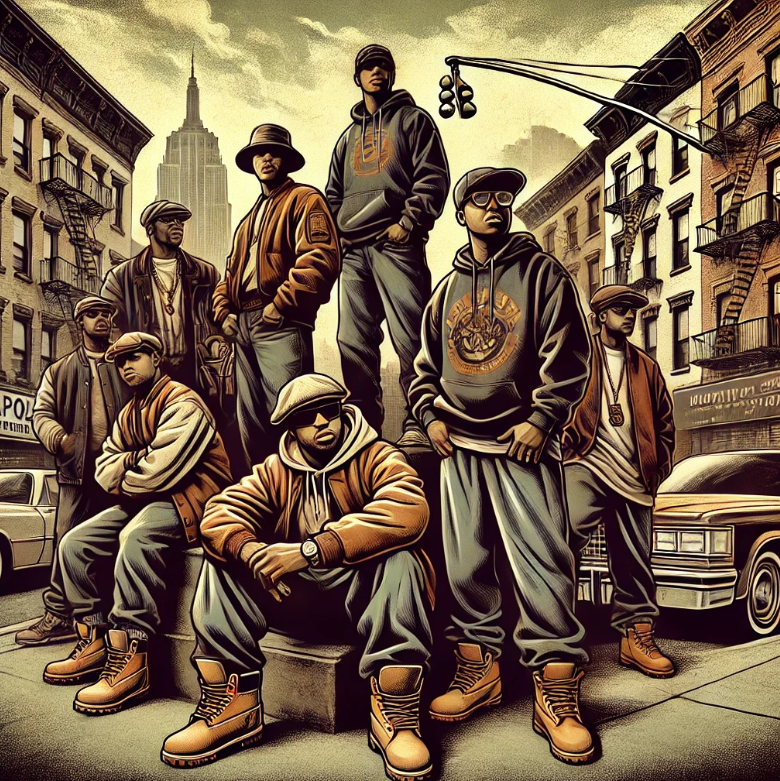


Hip Hop’s roots may stretch back to the Bronx, but Manhattan, and especially Harlem, helped shape its expansion into an undeniable force. From Harlem’s street corners to downtown’s loft parties, Manhattan provided the space where Hip Hop grew louder, flashier, and more influential.
Harlem, long a cultural nerve center for Black America, brought its flair and grit to Hip Hop. The neighborhood’s history of art, literature, and activism infused its artists with a sense of purpose and style. In the early ’80s, Kurtis Blow’s “The Breaks” turned Hip Hop into a commercial force, while towards the end of the ’80s, Rob Base & DJ E-Z Rock made the city dance with “It Takes Two.” Doug E. Fresh’s beatboxing mastery, Big L’s razor-sharp lyricism, and Cam’ron’s distinctive drawl are just a few other examples of Harlem’s diverse contributions.
The Apollo Theater on 125th Street was essential in connecting Harlem’s rich cultural past to its Hip Hop present. Known as a proving ground for performers of all stripes, the Apollo gave countless Hip Hop artists their first real stage. Showtime at the Apollo became a national platform, where audiences were quick to cheer for talent or boo mediocrity, honing the skills of now-legendary figures. For artists like Lauryn Hill, whose early appearance on the show is etched in memory, and countless others, the Apollo was a bridge to greater recognition. The venue’s electrifying energy and discerning crowds demanded authenticity and showmanship, qualities that became central to Harlem’s Hip Hop ethos.
Downtown Manhattan brought another flavor to the mix. The Beastie Boys channeled the energy of the Lower East Side, blending punk attitude with Hip Hop’s rhythm. Clubs like the Tunnel and Latin Quarter became proving grounds for rising stars and iconic venues for unforgettable performances. The borough’s recording studios—Chung King and the Hit Factory, among others—turned Manhattan into a hub for producing chart-topping classics.
Hip Hop’s fashion, media, and industry infrastructure were built in Manhattan, with labels like Def Jam starting in Greenwich Village and magazines like The Source chronicling the culture’s growth. Music video shoots lit up Times Square, while radio stations and TV studios amplified the sounds of the city.
This list of 25 albums celebrates Manhattan and Harlem’s immense role in shaping Hip Hop. Each record highlights the borough’s versatility, capturing sounds that range from gritty realism to vibrant celebration. These albums reflect the pulse of Manhattan, a borough where Hip Hop’s creativity and ambition flourished.
Full list: 25 Essential Manhattan Hip Hop Albums
25 Essential Memphis Hip Hop Albums
![]()
![]()
![]()
Memphis Hip Hop. The very name evokes a certain feeling: a thick, humid atmosphere, the rumble of low bass, and a directness in expression that pulls no punches. This isn’t the polished sound of coastal metropolises; this is music born from the streets, clubs, and car stereos of a city with a complex history. To understand Memphis Hip Hop, you have to understand its roots, which extend deep into the musical soil of the South.
Long before the rise of turntables and MCs, the Mississippi Delta, just south of Memphis, vibrated with the sounds of Black creative expression. The echoes of field hollers, call-and-response chants, and unique harmonic structures traveled upriver, influencing everything from gospel and blues to rock and roll and jazz. This rich musical heritage provided a foundation upon which a new sound would eventually build.
In the mid-1980s, something distinct began to happen in Memphis clubs and skating rinks. Black Memphians, driven by the pulse of heavy electronic bass, developed unique dance styles like jookin’ and gangsta walking. DJs like Spanish Fly, Zirk, and Squeeky provided the soundtrack: raw, lo-fi compositions built from samples, scratches, and a heavy dose of minor keys. This music reflected the experiences of a generation coming of age in the aftermath of social and economic shifts, a generation seeking expression in a city marked by its own struggles.
This early Memphis sound had a particular feel: a combination of angst, ingenuity, and a certain rawness. It was music made with limited resources, often distributed on mixtapes, giving it a distinct, almost underground quality. From this foundation, artists began to develop signature elements: the now-familiar eighth-note and triplet cadences, samples from soul and funk records, church-inspired keyboard melodies, snapping snares, and that ever-present hi-hat. These musical elements, combined with narratives of life in Memphis, created a specific and recognizable style.
This article explores 25 essential albums from this vibrant scene. These records provide an auditory journey through the development of Memphis Hip Hop, from its early, raw beginnings to its later, more polished forms. These are the sounds of a city, its people, and its experiences, presented with a directness and energy that continues to influence Hip Hop today.
Full list: 25 Essential Memphis Hip Hop Albums
25 Essential Miami Hip Hop Albums
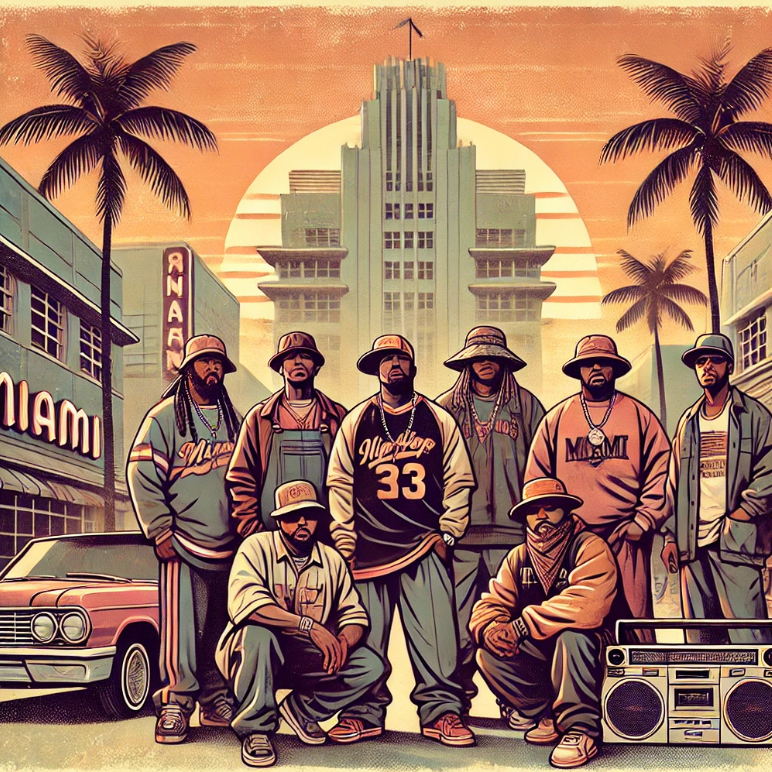


Miami Hip Hop has always been a force of nature, an unapologetically bold expression of its city’s vibrant, chaotic, and deeply cultural identity. Born in the neighborhoods where subwoofers rattle car windows and dance floors erupt into movement, its sound pulses with energy. Miami’s Hip Hop reflects a city where the sun shines bright, but shadows loom large, telling stories of triumph, struggle, celebration, and survival. From party-starting anthems to deeply introspective tracks, the evolution of this music mirrors the evolution of the city itself—resilient, multifaceted, and impossible to ignore.
The story begins in the late ’80s with the rise of Miami Bass. The 2 Live Crew emerged as the genre’s pioneers, pairing booming 808 drums with infectious hooks and a provocative edge that challenged societal norms and sparked debates about censorship. Their music was raw, unfiltered, and impossible to tune out—a sonic embodiment of Miami’s rebellious streak. Miami Bass wasn’t about intricate lyricism or complex storytelling; it was about energy, about getting people moving, and about amplifying the raw thrill of the moment.
As the ’90s unfolded, the city’s sound began to diversify. The rise of artists like Trick Daddy marked a shift toward grittier, more narrative-driven music. Tracks like “Nann” combined streetwise lyrics with beats that blended the rhythm of Miami’s bass heritage with more contemporary Southern influences. Trick Daddy’s work laid the foundation for a broader identity, one that embraced both the struggle and the swagger of life in Miami’s streets. Meanwhile, Poison Clan brought an early wave of Gangsta Rap to the city, offering stark, vivid portrayals of street life that resonated beyond Florida.
The mid-2000s saw Miami’s sound reach new heights of accessibility and grandeur with figures like Rick Ross and Pitbull. Rick Ross, with his deep, commanding baritone and opulent production, painted vivid pictures of ambition, luxury, and hustle. His debut album, Port of Miami, became a defining work of the era, merging cinematic instrumentals with a gritty depiction of life on the grind. Pitbull, on the other hand, fused Miami’s Latin influences with club-ready beats, creating music that celebrated the city’s multicultural heartbeat—and while we recognize Pitbull’s significance for the Miami music scene by mentioning him here, we didn’t include any of his pop-rap albums in the actual list because we feel none of them are particularly good.
Simultaneously with the ascend of figures like Rick Ross and Pitbull, a quieter revolution was brewing in the underground. Artists like SpaceGhostPurrp and Raider Klan brought darker, more introspective vibes, incorporating lo-fi aesthetics and eerie atmospheres that helped shape the burgeoning Cloud Rap movement. These experimental sounds paved the way for future innovators, including XXXTentacion, whose music explored themes of pain, anger, and vulnerability in ways that felt both deeply personal and universally relatable.
Today, Miami Hip Hop is a mosaic of styles and voices. From the bass-driven anthems of its origins to the emotionally charged experiments of its modern innovators, the city’s contributions to Hip Hop are as varied as its neighborhoods. This list of 25 essential Miami Hip Hop albums is a celebration of that diversity, a recognition of the sounds that have defined a city and influenced the genre on a global scale.
Full list: 25 Essential Miami Hip Hop Albums
25 Essential Minnesota Hip Hop Albums
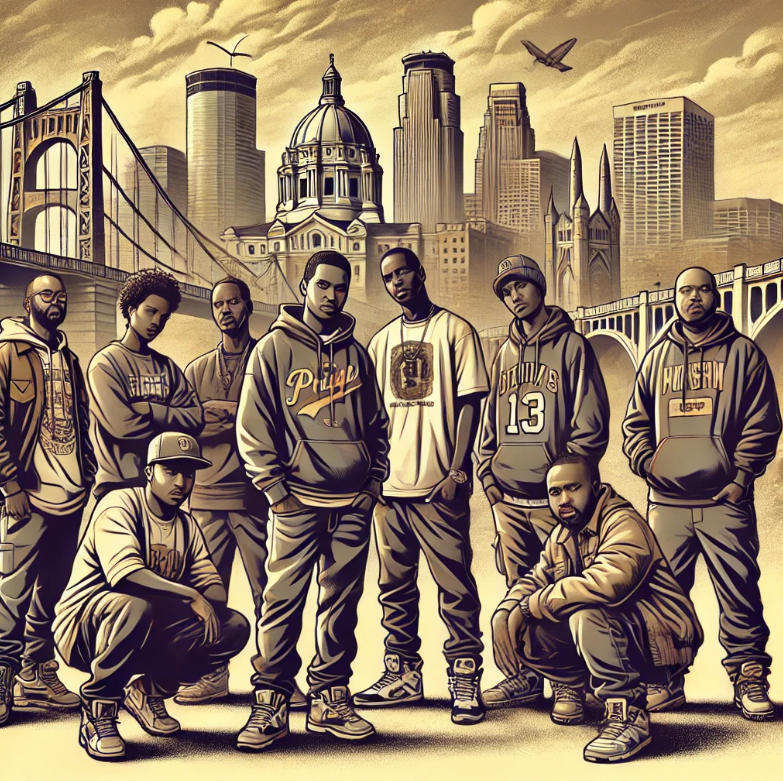


Minnesota Hip Hop, while often existing outside the mainstream spotlight, has cultivated a distinct and vibrant culture. This scene, built from the ground up through local gatherings and the dedication of artists and DJs, has produced a body of work that speaks to the unique experiences and creative spirit of the region. “25 Essential Minnesota Hip Hop Albums” delves into a selection of recordings that highlight the depth and variety of this often-unheard chapter of Hip Hop history.
The seeds of Hip Hop in the Twin Cities were planted in the early 1980s. DJs like Travitron played a key role in introducing the sound to local crowds, while radio stations like KMOJ became vital hubs, broadcasting new tracks and building a community around the developing genre. Early releases, such as “The Twin City Rapp” (1985) by David “T.C.” Ellis and C.T., represented the first steps in creating a lasting recorded history for Minnesota Hip Hop.
The scene’s growth faced obstacles. Early performance spaces were scarce, and Hip Hop often encountered resistance from establishments wary of the culture. Yet, a committed group of artists and fans persisted, creating their own avenues for expression and collaboration. This determination gave rise to influential figures and crews who shaped the character of Minnesota Hip Hop. Groups like Atmosphere, with their introspective lyrics and atmospheric production, became central figures, while the Doomtree collective, a sprawling crew of rappers and producers, introduced a dynamic and collaborative approach. Rhymesayers Entertainment, an independent label founded in Minneapolis, became a central force, providing a platform for many of these artists and helping to define the sound of the region. Brother Ali, known for his powerful delivery and socially conscious lyrics, is one artist who found a home on Rhymesayers.
This article digs into a collection of albums that trace different periods and styles within the state’s Hip Hop story. From early recordings that capture the raw energy of the scene’s beginnings to later works that explore complex themes and branch out in new musical directions, these albums offer a real taste of the creative fire burning in Minnesota artists. You’ll find selections from well-known groups and solo artists alongside some hidden gems that deserve a wider audience. We’ve focused on what makes each album tick musically, looking at the production, the lyrics, and the overall vibe the artist creates. We want to give you a detailed and engaging look at these records, to provide a sense of Minnesota’s unique contribution to Hip Hop.
Full list: 25 Essential Minnesota Hip Hop Albums
25 Essential New Jersey Hip Hop Albums
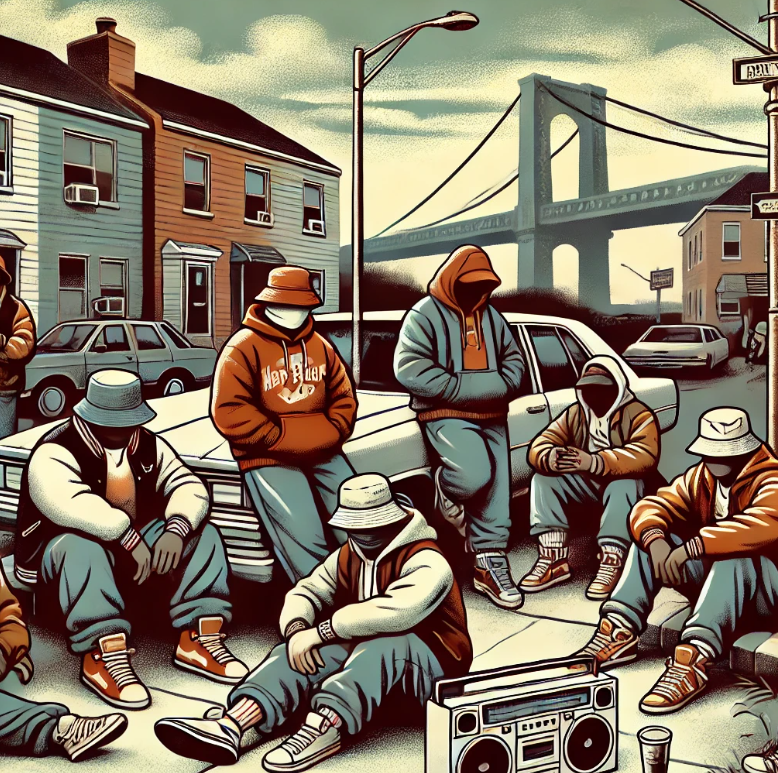


New Jersey Hip Hop is a study in contrasts. On one hand, the state has given rise to some of the most iconic voices in the genre, yet it’s often overlooked in larger conversations about regional rap scenes. For decades, the Garden State has been a bridge between New York City’s raw energy and Philadelphia’s rhythmic experimentation. This unique geography shapes its Hip Hop sound—a dynamic blend of gritty lyricism, smooth production, and unorthodox creativity that refuses to be boxed in.
From the block-party anthems of Naughty By Nature to the surreal, multilingual rhymes of Mach-Hommy, New Jersey Hip Hop albums are steeped in personality. They move between different emotional tones with ease, from celebratory to reflective, grimy to poetic. The beats often carry an edge: dusty drum loops, razor-sharp samples, and basslines that punch through speakers. Yet there’s an inventiveness, too, with producers reworking funk grooves, Caribbean rhythms, and even avant-garde jazz into their tracks. These aren’t records that follow trends—they create their own lanes.
The emcees are storytellers at heart, each bringing their own voice to the mic. Redman’s offbeat humor and relentless delivery feel like an adrenaline rush, while Lauryn Hill’s introspective poise on her neo-soul classic The Miseducation of Lauryn Hill cuts deep with emotional clarity. Artists like Rah Digga channel the razor-sharp lyricism that feels rooted in the cypher battles of Newark, while outsiders like El Da Sensei and Tame One (of Artifacts) craft bars that are as intellectual as they are street-smart.
New Jersey’s Hip Hop identity thrives in its diversity. It’s not tied to a singular style or era. It can be rugged and underground, like the lo-fi mystique of Mach-Hommy, or mainstream and magnetic, like Queen Latifah’s reign as one of rap’s first royalty. In every corner of the state, from Paterson to Camden, artists continue to turn local experiences into timeless music.
This list of 25 albums is a journey through the sound and soul of New Jersey Hip Hop. It highlights the state’s quiet but undeniable contributions to the culture—records that are as vibrant and varied as the state itself.
Full list: 25 Essential New Jersey Hip Hop Albums
25 Essential New Orleans Hip Hop Albums
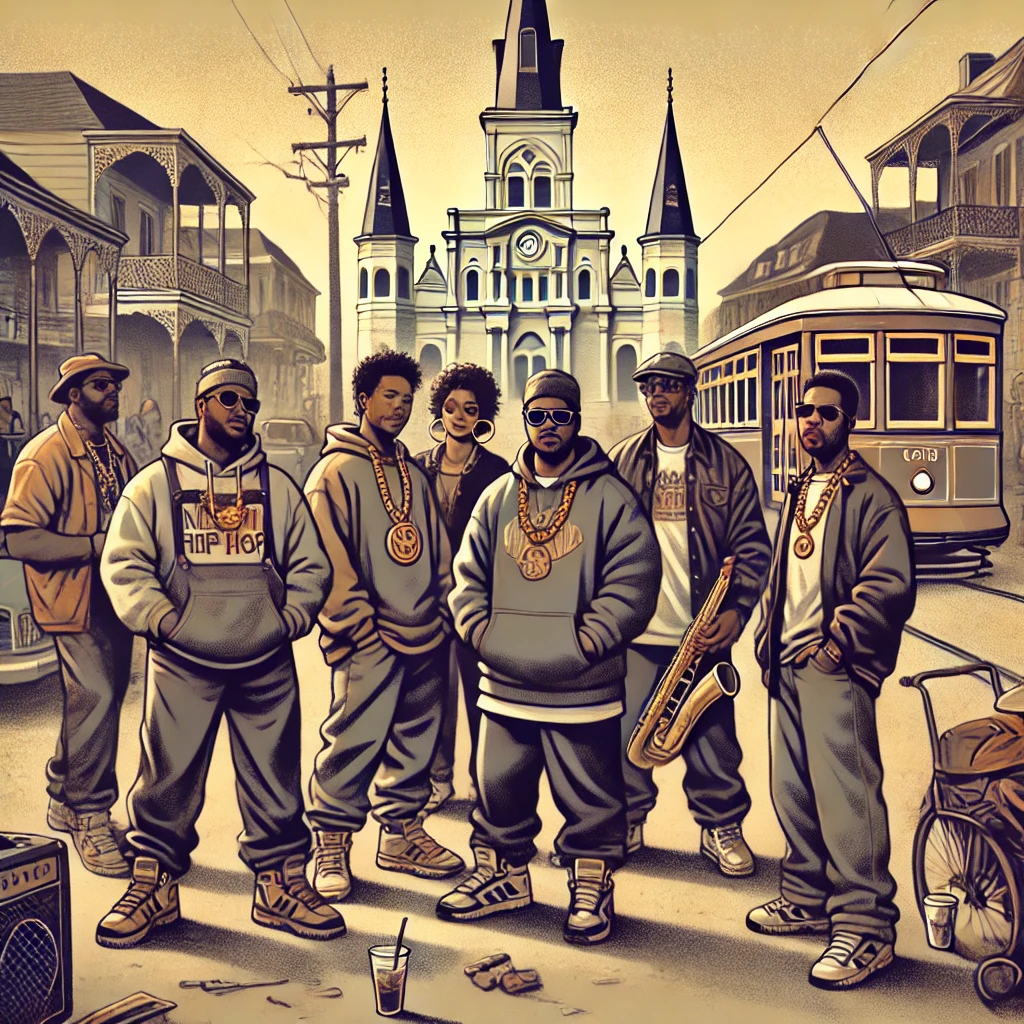


New Orleans Hip Hop moves like the city it calls home—sweaty, rhythmic, and alive with history. It’s a sound that can trace its lineage to the same streets where brass bands parade through second lines and where call-and-response echoes from church pews to block parties. This is a place where music is lived. And that spirit courses through every bar, beat, and bassline of the city’s Hip Hop.
At its core, New Orleans Hip Hop is about movement—literal and figurative. In the early 1990s, bounce music burst from small clubs and neighborhood parties, fueled by frenetic tempos, local chants, and the endlessly versatile “Triggerman” beat. Tracks like MC T. Tucker and DJ Irv’s “Where Dey At” gave voice to the city’s wards and projects, turning a dancefloor callout into a communal anthem. Bounce wasn’t polished, and it wasn’t meant to be. It thrived in its rawness, bringing people together with a driving energy that felt uniquely New Orleans.
But the city’s rap scene didn’t stop at bounce. As the 1990s progressed, New Orleans became a hub for larger-than-life labels like No Limit Records and Cash Money Records, each staking their claim on the national stage with distinct styles. No Limit’s music hit like a tank, heavy and relentless, blending gangsta rap with streetwise hustle. Master P, Mia X, and Mystikal captured the grind and grit of their surroundings, while producers like Beats by the Pound layered tracks with the swampy, percussive pulse of the city.
Cash Money, on the other hand, carried the block party into the mainstream. Mannie Fresh’s beats bounced with bright, syncopated energy, while artists like Juvenile and Lil Wayne delivered charismatic flows that defined the Dirty South for a generation. Tracks like Juvenile’s “Back That Azz Up” turned regional rhythms into national anthems, and by the late 1990s, the city had become an undeniable force in Hip Hop.
Through hurricanes, tragedies, and upheaval, New Orleans Hip Hop has persisted. It’s adaptable, but its essence never strays far from the city’s roots. NOLA music carries the weight of its origins and the unshakable joy of its creators. These 25 albums tell that story—one of resilience, rhythm, and a sound unlike any other.
Full list: 25 Essential New Orleans Hip Hop Albums
25 Essential New York State Hip Hop Albums
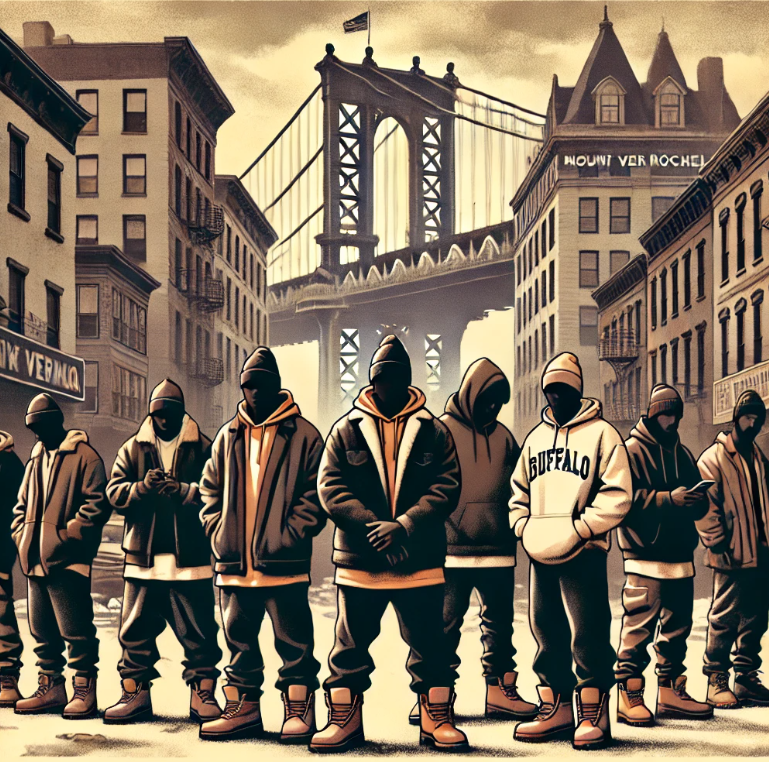


New York City has long been recognized as the birthplace of Hip Hop, with boroughs like the Bronx, Brooklyn, Queens, and Staten Island shaping the genre’s early sound and culture. In a previous article, we highlighted 25 essential Hip Hop albums from these iconic NYC neighborhoods. But New York State’s Hip Hop story doesn’t end there. Beyond the five boroughs, the rest of the state has produced a wealth of influential albums, each carrying its own unique sound and perspective. This list focuses on the artists and records that emerged from cities like Mount Vernon, New Rochelle, Buffalo, and beyond, demonstrating that New York State’s influence stretches far beyond the city limits.
From the soulful sample-driven beats of Mount Vernon’s Pete Rock to the gritty, hard-hitting sound of Buffalo’s Griselda crew, these albums represent a wide range of styles that reflect the diverse landscapes and experiences of the state. The music is just as varied as the places these artists come from—whether it’s the reflective, jazz-infused tracks from upstate or the sharp, streetwise rhymes from cities like Hempstead and New Rochelle. Each record tells a story of local pride, struggle, and triumph, offering an alternate view of New York’s Hip Hop scene that doesn’t always make the headlines but remains just as essential.
Many of the albums on this list also highlight the ways in which Hip Hop from outside the city has evolved over time. While New York City’s dominance in the genre is well-documented, these upstate and Long Island artists have carved out their own lanes, developing sounds and flows that reflect their distinct surroundings. The beats may be less polished, the lyrics might be more introspective, or the tone could lean toward a darker edge, but these albums offer something different from the mainstream while still contributing to the larger Hip Hop narrative.
This list doesn’t just celebrate artists who’ve had a significant impact on the genre; it also reflects the resilience and creativity of those working in the shadow of the city that birthed Hip Hop. Some of these 25 albums from New York State are as vital to the history of the genre as any record that came out of the five boroughs.
Full list: 25 Essential New York State Hip Hop Albums
25 Essential North Carolina Hip Hop Albums
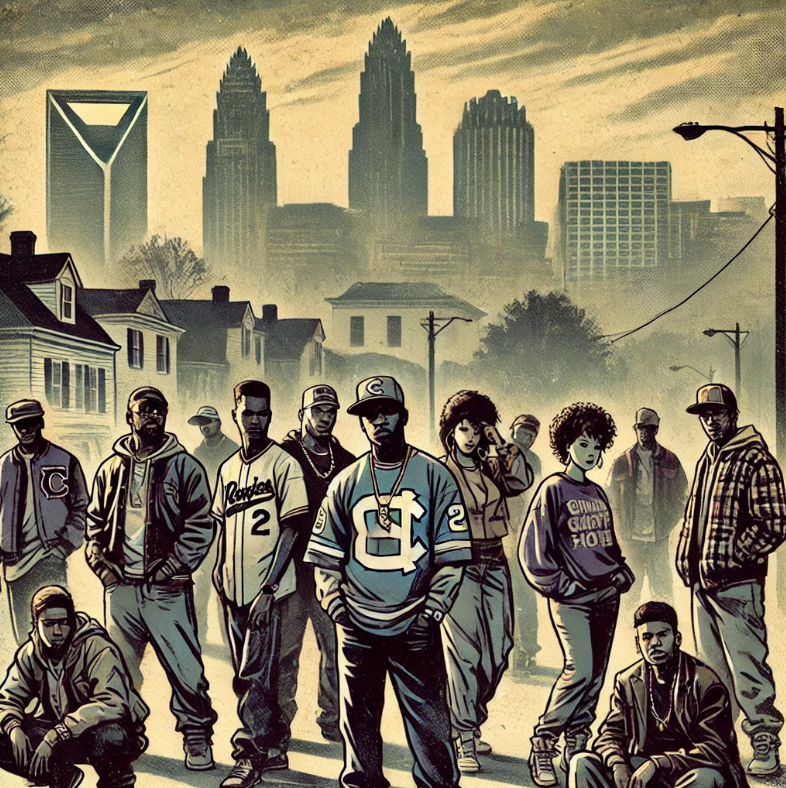


North Carolina, celebrated for its diverse landscapes and rich history, is also vital in Hip Hop’s development. A unique sound has emerged from the coast to the mountains, reflecting the experiences and stories of the state’s communities. “25 Essential North Carolina Hip Hop Albums” explores a selection of recordings that highlight the depth and range of this vibrant scene.
The beginnings of North Carolina Hip Hop can be traced to the 1980s, shaped by the genre’s growth in major cities like New York and Los Angeles. Early artists brought this culture to local areas, mixing beats, rhymes, and narratives that connected with regional experiences. The music gave voice to the realities of life in cities such as Raleigh, Charlotte, Durham, and Fayetteville. The state’s varied musical background, including gospel, blues, and jazz, provided fertile ground for Hip Hop to take root. Artists began incorporating these influences, blending traditional sounds with modern production. The growth of local DJs and breakdancers also contributed to the expanding Hip Hop culture, preparing the way for a movement that would eventually gain national attention.
North Carolina has produced some of Hip Hop’s most important figures. These artists have not only raised the state’s profile but have also made a lasting impact on the genre. J. Cole, from Fayetteville, is perhaps the most recognized name in North Carolina Hip Hop. With albums like 2014 Forest Hills Drive, he has connected with listeners through introspective lyrics and social commentary. His label, Dreamville, has become a significant force, nurturing talents like Rueben Vincent, The Musalini, and Khrysis. Little Brother, a trio from Durham consisting of Phonte, Rapper Big Pooh, and producer 9th Wonder, gained recognition in the early 2000s with their debut album, The Listening, known for its soulful production and thoughtful lyrics. 9th Wonder has since become a highly respected producer, working with artists such as Jay-Z and Beyoncé. Rapsody, from Snow Hill, is a lyrical artist known for her complex wordplay and meaningful content. Signed to 9th Wonder’s Jamla Records, her albums such as Laila’s Wisdom and Eve have earned critical praise.
This article dives into a collection of albums that trace different eras and styles within the state’s Hip Hop history. From early recordings that capture the energy of the scene’s beginnings to later works that delve into complex themes and explore new musical directions, these albums offer a real taste of the creative spirit of North Carolina artists. You’ll find selections from well-known groups and solo artists alongside some hidden gems that deserve a wider audience.
Full list: 25 Essential North Carolina Hip Hop Albums
25 Essential Philadelphia Hip Hop Albums
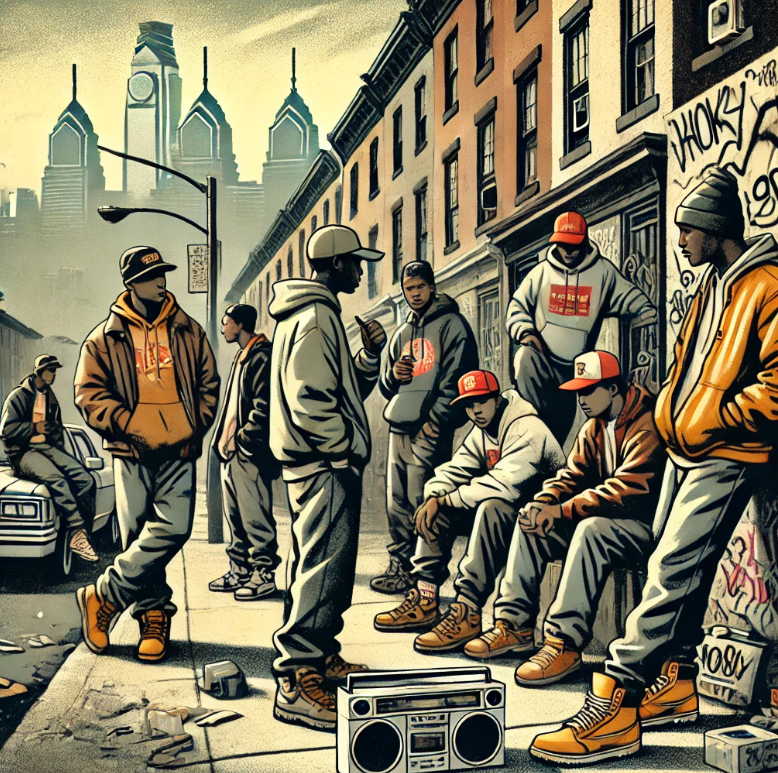


Philadelphia has always moved to its own rhythm. Hip Hop has found fertile ground to grow and evolve in a city where history seems etched into every brick and cobblestone. From gritty neighborhoods to bustling corners alive with conversation, Philly’s Hip Hop scene carries the weight of its environment—unpolished, raw, and brimming with character. It doesn’t mimic the style of its neighbors; it builds its own narrative. Whether through the hard edges of streetwise lyricism or the seamless fusion of live instrumentation and intricate beats, Philadelphia’s Hip Hop carries a immediate and timeless pulse.
Unlike the spotlight that has long shone on New York or Los Angeles, Philadelphia’s Hip Hop culture exists with a certain resilience. It’s less concerned with acclaim and more rooted in authenticity, creating a sound that reflects the city’s complex identity. The stories told here are as much about survival as they are celebration, framed by the hard realities of urban life but elevated by a community-driven spirit. This is a city that embraces its imperfections, where vulnerability and bravado can coexist in the same bar. From the groundbreaking brashness of Schoolly D to the intricate lyricism of Black Thought, Philly’s Hip Hop is unmistakably honest.
Philadelphia’s soundscape is as varied as its neighborhoods. There’s the unrelenting intensity of underground titans like Jedi Mind Tricks, the soulful poise of Bahamadia, and the fiery anthems of Beanie Sigel and State Property. These artists don’t simply inhabit their music—they make it visceral, transforming beats and bars into something almost tangible. Then there’s the charisma of Will Smith in his Fresh Prince era, who brought humor and storytelling to the mainstream while staying connected to his roots. Whether it’s street anthems or introspective tracks, Philly artists consistently draw from the city’s energy, delivering music that feels lived-in and grounded. And long before many of these names emerged, Lady B helped pave the way, laying the foundation for Philly’s Hip Hop scene with her groundbreaking single, “To the Beat Y’all,” in 1979.
While Meek Mill is undeniably one of the biggest names in Philly rap today and deeply representative of the city’s culture, we’ve chosen not to include him here simply because we’re not fans of his music. The same goes for Eve and her Ruff Ryders-era pop-rap albums. Even leaving off Meek Mill and Eve, this list of 25 essential Philly albums offers a representative walk through the city’s Hip Hop history and reflects how its creativity has endured. Each record here reflects a piece of Philadelphia’s identity, offering snapshots of an ever-evolving culture. From pioneers to later innovators, these albums are a reminder that, in Philly, Hip Hop isn’t just music—it’s a way of life.
Full list: 25 Essential Philadelphia Hip Hop Albums
25 Essential Queens Hip Hop Albums
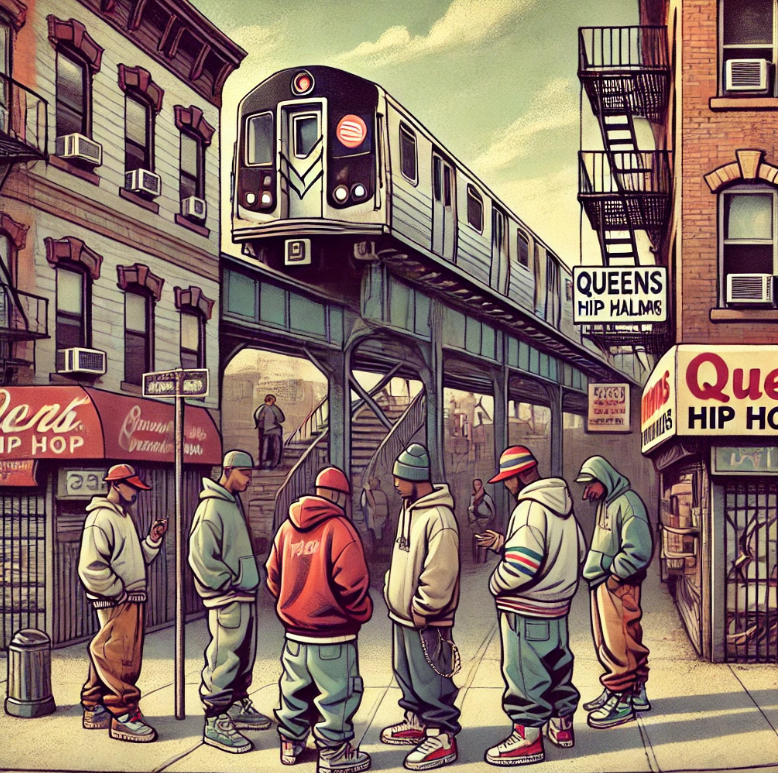


Queens. The name itself carries a certain weight in the world of Hip Hop. While the Bronx is often cited as its birthplace, Queens quickly became a vital hub, a breeding ground for artists who would shape the genre’s trajectory. This borough, with its diverse neighborhoods and complex social fabric, provided a rich backdrop for musical innovation. This list of 25 essential albums delves into the unique contributions of Queens to Hip Hop, exploring the sounds, moods, and structures that define its distinct voice.
From the early days, Queens artists displayed a remarkable ability to blend street narratives with musical experimentation. Run-DMC, hailing from Hollis, brought a raw energy to the scene, their minimalist beats and powerful rhymes creating a new template for Hip Hop. Tracks like “Sucker MC’s” and their collaboration with Aerosmith on “Walk This Way” demonstrated the group’s ability to connect with a broad audience while maintaining their core identity. This fusion of rock and rap, with its driving guitars and heavy drums, opened up new possibilities for the genre.
The rise of the Juice Crew, centered around producer Marley Marl, further cemented Queens’ importance. Operating out of the Queensbridge Houses, Marl cultivated a stable of talented MCs, including Queens natives Kool G Rap and Roxanne Shanté. Shanté’s “Roxanne’s Revenge,” a response to UTFO’s “Roxanne, Roxanne,” became an early example of Hip Hop’s diss track tradition, showcasing the lyrical dexterity and competitive spirit that would become a hallmark of the genre. The track’s simple, yet effective beat, paired with Shanté’s sharp delivery, created a blueprint for future female MCs.
The 1990s witnessed the emergence of a new generation of Queens artists who pushed the music in different directions. A Tribe Called Quest, from St. Albans, brought a jazz-influenced sensibility to Hip Hop, their intricate samples and thoughtful lyrics creating a more introspective and melodic sound. Albums like The Low End Theory featured complex rhythms and smooth basslines, providing a contrast to the harder-edged sounds that were also prevalent at the time. Tracks like “Check the Rhime” displayed their unique approach, blending intricate wordplay with a laid-back groove.
Simultaneously, artists like Nas and Mobb Deep offered a grittier portrayal of life in Queensbridge. Nas’s Illmatic, with its vivid depictions of street life and introspective rhymes, became an instant classic. Tracks such as “N.Y. State of Mind” and “The World Is Yours” offered a stark and honest view of the realities of urban existence, with detailed descriptions and complex rhyme schemes. Mobb Deep, with their dark, ominous production and hardcore lyrics, contributed to the rise of hardcore Hip Hop in the mid-90s. The Infamous explored themes of survival and struggle, with tracks like “Shook Ones Pt. II” becoming anthems of the streets.
This list examines these varied approaches and many more, exploring the albums that have defined Queens Hip Hop. It’s a celebration of the borough’s diverse talent, its enduring influence, and its crucial place in Hip Hop history.
Full list: 25 Essential Queens Hip Hop Albums
25 Essential Staten Island Hip Hop Albums
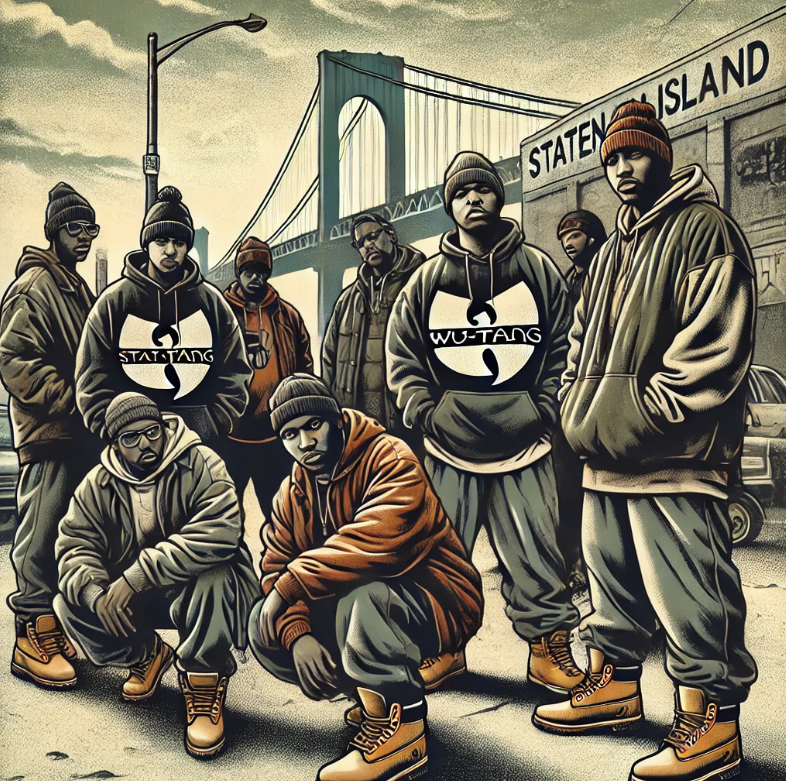


Staten Island may be the quietest of New York City’s boroughs, but its Hip Hop legacy roars. It’s here that a gritty, innovative sound grew out of the island’s isolation, transforming an underdog narrative into one of the genre’s most influential chapters. Known colloquially as “Shaolin,” Staten Island gave the world Wu-Tang Clan—a crew whose impact reshaped Hip Hop’s sonic and cultural framework. Their raw lyricism and cinematic production opened a portal to a mythic realm, where kung fu flicks met streetwise philosophy.
Wu-Tang wasn’t Staten Island’s first foray into Hip Hop. In the ’80s, Force MDs blended rap and R&B with striking harmony, and Lord Shafiyq’s “My Mic Is on Fire” added heat to the scene. But the island’s Hip Hop story vaulted to prominence in the ’90s with Enter the Wu-Tang (36 Chambers)—a masterpiece of lo-fi beats and unrelenting rhymes. Staten Island became synonymous with the Clan’s ferocity, a place where music could be as unpredictable as a kung fu sparring match, with tracks that punched, jabbed, and flowed with raw agility.
The island’s physical separation from NYC’s core neighborhoods helped carve its unique Hip Hop identity. The Staten Island Ferry became a literal and symbolic bridge, shuttling artists and hustlers across the harbor while keeping their perspective rooted in the island’s distinct energy. This blend of isolation and connection fostered a self-contained creativity that shaped Wu-Tang’s rise and the borough’s extended Hip Hop family, including 2nd Generation Wu and solo artists who built on their predecessors’ foundation.
Staten Island’s Hip Hop albums recount life; bending and twisting its contours, layering sharp verses over beats that lurch, loop, and linger. From RZA’s labyrinthine production to Ghostface Killah’s storytelling, these records pulse with intensity, humor, and vision. They’re the sound of struggle transformed into art—albums that reflect the borough’s unyielding spirit and add to the greater mosaic of New York’s music history.
The 25 albums we explore here span decades, illuminating the depth of Staten Island’s contributions to Hip Hop. Each record is an artifact of resilience and innovation, proof that greatness often grows from unexpected corners.
Full list: 25 Essential Staten Island Hip Hop Albums
Essential Hip Hop Albums By Region: A Playlist Across The Map (10.000 Songs, 650 Hours)
Extra: 25 Essential UK Hip Hop Albums
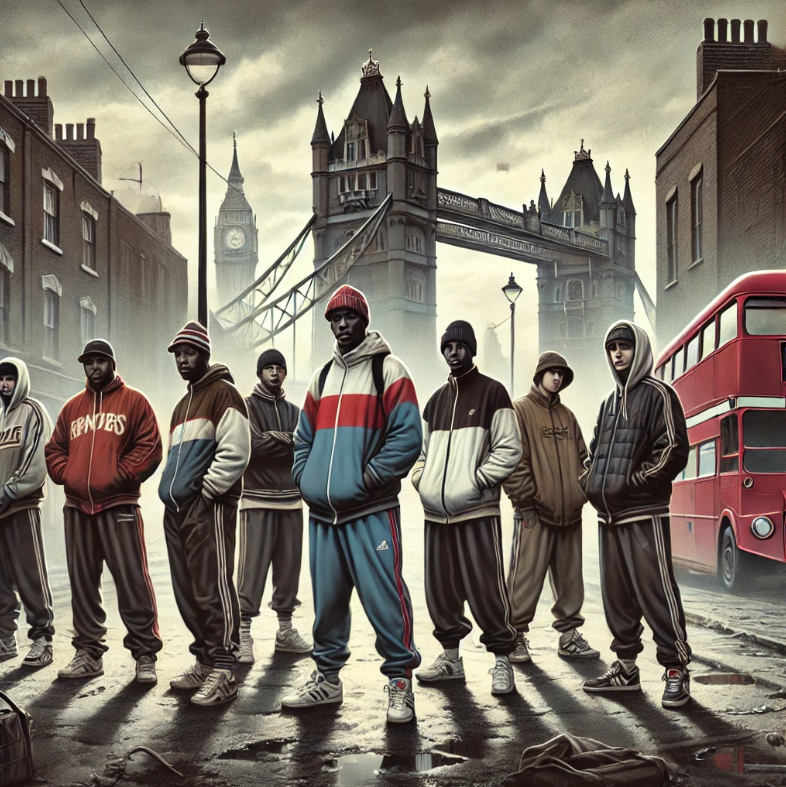


The story of UK Hip Hop is one of constant evolution, shaped by its unique ability to absorb, transform, and amplify a world of influences. Unlike its American counterpart, UK Hip Hop developed in parallel with a host of other genres born in the same vibrant, often turbulent communities. From the early days of sound system culture, where reggae toasting met the crisp bite of electronic beats, to the present dominance of drill, UK Hip Hop has always been more than music—it’s a dialogue, a mirror, and a release.
To understand its essence, one must listen not just for the bars but for the textures. UK Hip Hop thrives on specificity, both sonically and lyrically. It’s the way Roots Manuva’s “Witness (1 Hope)” balances an off-kilter bassline with the unmistakable cadence of South London, or the intricate layers Jehst weaves into Return of the Drifter. It’s the punch of a boom-bap beat juxtaposed with sharp, observational storytelling, as on Skinnyman’s Council Estate of Mind, where personal and political blend seamlessly.
This music carries the weight of its environment. Albums like Dizzee Rascal’s Boy in da Corner encapsulate the grit and intensity of life on the estates, while later releases, like Dave’s Psychodrama, channel introspection and a broader sociopolitical lens. The sound shifts, but the urgency remains—a thread that ties the early days of London Posse to the high-charting successes of Skepta and Stormzy.
UK Hip Hop also thrives on collaboration, borrowing rhythms from garage, grime, jungle, and more. It’s in the pounding, syncopated energy of grime’s earliest clashes, the shadowy menace of road rap, and the hypnotic pulse of today’s drill. These influences don’t dilute the genre; they enrich it, creating a music scene that is as diverse as the communities that birthed it.
In this list of 25 essential UK Hip Hop albums, we delve into the releases that define the genre, from underground classics to mainstream breakthroughs. Each record offers a piece of the puzzle—a snapshot of time, place, and perspective. Together, they tell the story of a scene that refuses to stand still, constantly evolving while remaining rooted in the experiences of Black British culture and working-class resilience.
Full list: 25 Essential UK Hip Hop Albums
Extra: 25 Essential Cross-Regional Hip Hop Albums
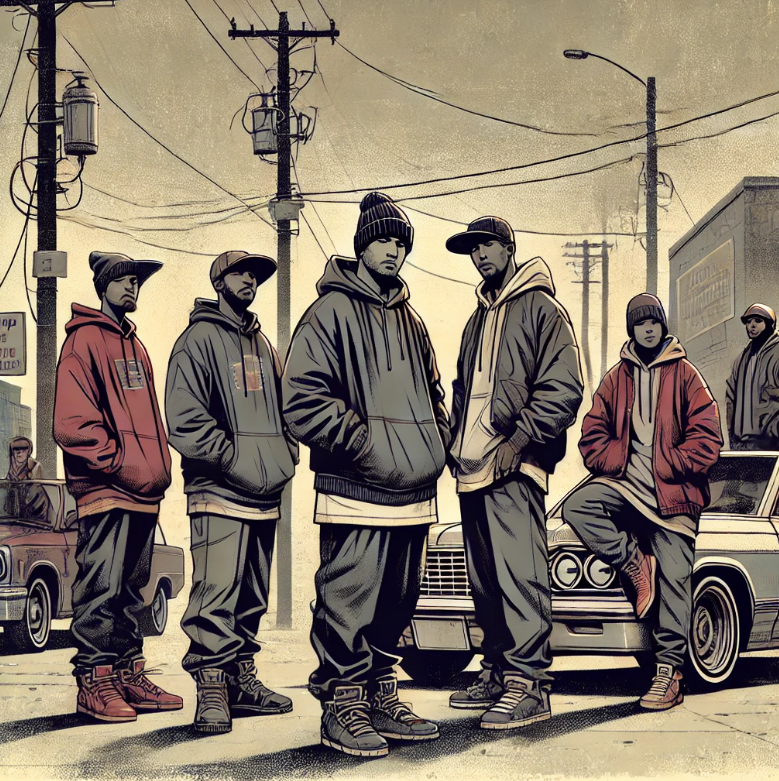


We’ve curated a series of lists that dive deep into the vibrant, distinct local and regional Hip Hop scenes that have shaped the genre. From the booming trap sounds of Atlanta to the gritty streets of Queens, we’ve explored how these unique pockets of the country have crafted their own identities through music. But Hip Hop is not just about where you’re from—it’s about collaboration, connection, and the melding of diverse influences.
This article takes a look at 25 essential cross-regional Hip Hop albums, projects born from the union of artists across the country. These albums are collaborations that transcend local sounds and reflect Hip Hop’s dynamic evolution. Think Madvillain’s Madvillainy, a seamless blend of MF DOOM’s complex lyricism from the East Coast and Madlib’s off-kilter, jazzy beats from the West, or Run the Jewels by Killer Mike and El-P, which merges Southern rap’s sharp social consciousness with New York’s aggressive, punchy production.
At the core of the projects included here is a shared understanding of Hip Hop’s roots, but they also reflect how far the genre has come. These artists step outside their usual comfort zones and work with those from sometimes vastly different backgrounds, both musically and culturally. Here, we explore 25 albums that break down the barriers between regional scenes and illustrate how Hip Hop continues to evolve through collaboration and innovation.
Full list: 25 Essential Cross-Regional Hip Hop Albums
This post was originally published on this site be sure to check out more of their content.



